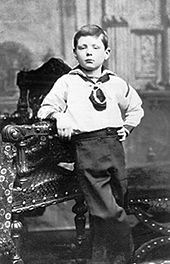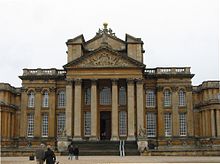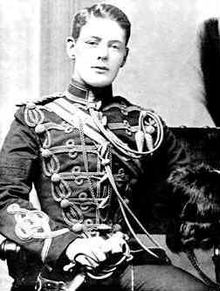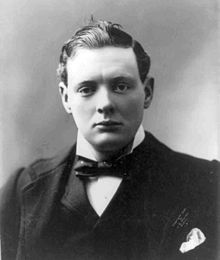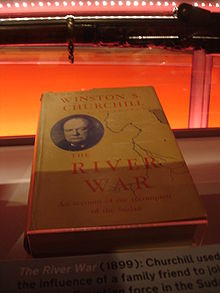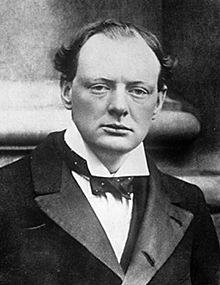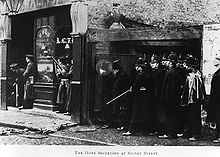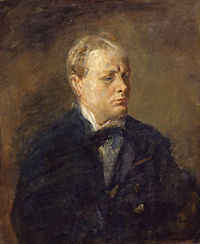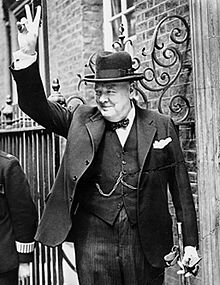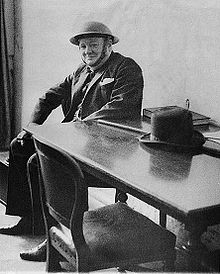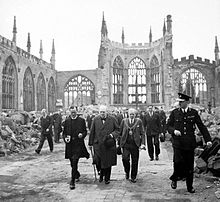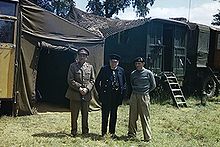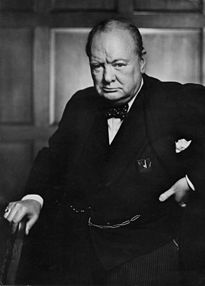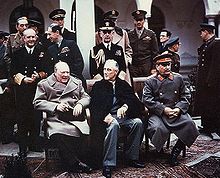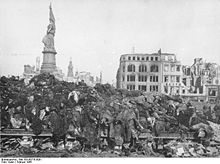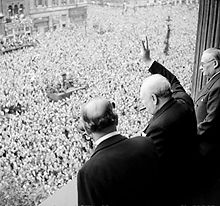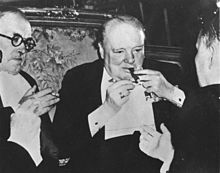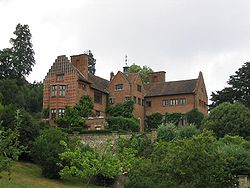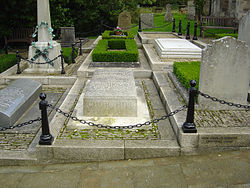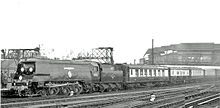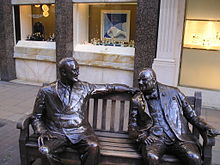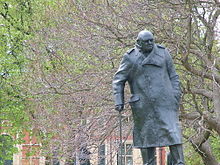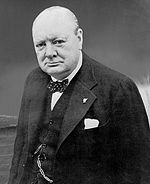- Winston Churchill
-
The Right Honourable
Sir Winston Churchill
KG OM CH TD PC DL FRS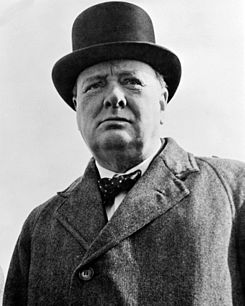
Prime Minister of the United Kingdom In office
26 October 1951 – 7 April 1955Monarch George VI
Elizabeth IIDeputy Anthony Eden Preceded by Clement Attlee Succeeded by Anthony Eden In office
10 May 1940 – 26 July 1945Monarch George VI Deputy Clement Attlee Preceded by Neville Chamberlain Succeeded by Clement Attlee Minister of Defence In office
28 October 1951 – 1 March 1952Prime Minister Himself Preceded by Emanuel Shinwell Succeeded by The Earl Alexander of Tunis In office
10 May 1940 – 26 July 1945Prime Minister Himself Preceded by The Lord Chatfield as Minister for Coordination of Defence Succeeded by Clement Attlee Chancellor of the Exchequer In office
6 November 1924 – 4 June 1929Prime Minister Stanley Baldwin Preceded by Philip Snowden Succeeded by Philip Snowden Home Secretary In office
19 February 1910 – 24 October 1911Prime Minister Herbert Henry Asquith Preceded by Herbert Gladstone Succeeded by Reginald McKenna President of the Board of Trade In office
12 April 1908 – 14 February 1910Prime Minister Herbert Henry Asquith Preceded by David Lloyd George Succeeded by Sydney Buxton Member of Parliament
for WoodfordIn office
5 July 1945 – 15 October 1964Preceded by New constituency Succeeded by Patrick Jenkin Member of Parliament
for EppingIn office
29 October 1924 – 5 July 1945Preceded by Sir Leonard Lyle Succeeded by Leah Manning Member of Parliament
for Dundee
with Alexander WilkieIn office
24 April 1908 – 15 November 1922Preceded by Alexander Wilkie
Edmund RobertsonSucceeded by Edmund Morel
Edwin ScrymgeourMember of Parliament
for Manchester North WestIn office
8 February 1906 – 24 April 1908Preceded by William Houldsworth Succeeded by William Joynson-Hicks Member of Parliament
for Oldham
with Alfred EmmottIn office
24 October 1900 – 12 January 1906Preceded by Walter Runciman
Alfred EmmottSucceeded by Alfred Emmott
John Albert BrightPersonal details Born Winston Leonard Spencer-Churchill
30 November 1874
Blenheim Palace, Woodstock, Oxfordshire,
England, United KingdomDied 24 January 1965 (aged 90)
28 Hyde Park Gate, London, EnglandResting place St Martin's Church, Bladon, Oxfordshire Nationality British Political party Conservative (1900–04, 1924–64)
Liberal (1904–24)Spouse(s) Clementine Churchill (m. 1908–1965) Relations Lord Randolph Churchill (father)
Lady Randolph Churchill (mother)
John Strange Spencer-Churchill (brother)
Pamela Harriman (former daughter-in-law)
Winston Churchill (grandson)Children Diana Churchill
Randolph Churchill
Sarah Tuchet-Jesson
Marigold Churchill
Mary SoamesResidence 10 Downing Street (Official)
Chartwell (Private)
28 Hyde Park Gate, London (Private, place of death)Alma mater Harrow School, Royal Military Academy Sandhurst Profession Member of Parliament, statesman, soldier, journalist, historian, author, painter Religion Anglican Military service Allegiance British Empire Service/branch British Army Years of service 1895–1900, 1902–24 Rank Lieutenant-Colonel Battles/wars Anglo-Afghan War First World War
Awards  Order of Merit
Order of Merit
 Companion of Honour
Companion of Honour
 India Medal
India Medal
 Queen's Sudan Medal
Queen's Sudan Medal
 Queen's South Africa Medal
Queen's South Africa Medal
 1914–15 Star
1914–15 Star
 British War Medal
British War Medal
 Victory Medal
Victory Medal
Territorial Decoration
Sir Winston Leonard Spencer-Churchill, KG, OM, CH, TD, PC, DL, FRS, Hon. RA (30 November 1874 – 24 January 1965) was a predominantly Conservative British politician and statesman known for his leadership of the United Kingdom during the Second World War. He is widely regarded as one of the greatest wartime leaders of the century and served as Prime Minister twice (1940–45 and 1951–55). A noted statesman and orator, Churchill was also an officer in the British Army, a historian, a writer, and an artist. He is the only British prime minister to have received the Nobel Prize in Literature, and was the first person to be made an Honorary Citizen of the United States.
Churchill was born into the aristocratic family of the Dukes of Marlborough. His father, Lord Randolph Churchill, was a charismatic politician who served as Chancellor of the Exchequer; his mother, Jenny Jerome, an American socialite. As a young army officer, he saw action in British India, the Sudan and the Second Boer War. He gained fame as a war correspondent and through books he wrote about his campaigns.
At the forefront of politics for fifty years, he held many political and cabinet positions. Before the First World War, he served as President of the Board of Trade, Home Secretary and First Lord of the Admiralty as part of the Asquith Liberal government. During the war, he continued as First Lord of the Admiralty until the disastrous Gallipoli Campaign, which he had sponsored, caused his departure from government. He then served briefly on the Western Front, commanding the 6th Battalion of the Royal Scots Fusiliers. He returned to government as Minister of Munitions, Secretary of State for War, and Secretary of State for Air. After the War, Churchill served as Chancellor of the Exchequer in the Conservative (Baldwin) government of 1924–29, controversially returning the pound sterling in 1925 to the gold standard at its pre-War parity, a move widely seen as creating deflationary pressure on the UK economy. Also controversial were Churchill's opposition to increased home rule for India, and his resistance to the 1936 abdication of Edward VIII.
Out of office and politically "in the wilderness" during the 1930s, Churchill took the lead in warning about the danger from Hitler and in campaigning for rearmament. On the outbreak of the Second World War, he was again appointed First Lord of the Admiralty. Following the resignation of Neville Chamberlain on 10 May 1940, Churchill became Prime Minister. His steadfast refusal to consider defeat, surrender or a compromise peace helped inspire British resistance, especially during the difficult early days of the War when Britain stood alone in its active opposition to Hitler. Churchill was particularly noted for his speeches and radio broadcasts, which helped inspire the British people. He led Britain as Prime Minister until victory had been secured over Nazi Germany.
After the Conservative Party lost the 1945 election, he became Leader of the Opposition. In 1951, he again became Prime Minister, before retiring in 1955. Upon his death, Elizabeth II granted him the honour of a state funeral, which saw one of the largest assemblies of world statesmen ever.[1] Named the Greatest Briton of all-time in a 2002 poll, Churchill is widely regarded as being among the most influential persons in British history.
Family and early life
Born into the aristocratic family of the Dukes of Marlborough, a branch of the Spencer family,[2] Winston Leonard Spencer-Churchill, like his father, used the surname Churchill in public life.[3] His ancestor George Spencer had changed his surname to Spencer-Churchill in 1817 when he became Duke of Marlborough, to highlight his descent from John Churchill, 1st Duke of Marlborough. Winston's father, Lord Randolph Churchill, the third son of John Spencer-Churchill, 7th Duke of Marlborough, was a politician; and his mother, Lady Randolph Churchill (née Jennie Jerome) was the daughter of American millionaire Leonard Jerome. Winston was born on 30 November 1874, two months prematurely, in a bedroom in Blenheim Palace, Woodstock, Oxfordshire,[4]
From age two to six, he lived in Dublin where his Grandfather was appointed Viceroy and who had Churchill's father as his private secretary. Churchill had one brother, John Strange Spencer-Churchill who was born during this time in Ireland. It has been claimed that the young Winston first developed his fascination with militarism from watching the many military parades pass by the Vice Regal Lodge (now Áras an Uachtaráin, the official residence of the President of Ireland).[5][6]
Winston's earliest attempts at education occurred in Dublin. A governess tried teaching him reading, writing and arithmetic. His first reading book was called 'Reading Without Tears'. His Nanny 'Mrs' Everest was his confidante, nurse and mother and they spent many happy hours playing in the Phoenix Park. [7]
Independent and rebellious by nature, Churchill generally did poorly in school, for which he was punished. He was educated at three independent schools: St. George's School, Ascot, Berkshire, followed by Brunswick School in Hove, near Brighton (the school has since been renamed Stoke Brunswick School and relocated to Ashurst Wood in West Sussex) and then at Harrow School from 17 April 1888, where his military career began. Within weeks of his arrival, he had joined the Harrow Rifle Corps.[8] He earned high marks in English and History and was the school's fencing champion.
He was rarely visited by his mother (then known as Lady Randolph Churchill) and wrote letters begging her to either come to the school or to allow him to come home. His relationship with his father was a distant one; he once remarked that they barely spoke to each other.[9] Because of the lack of parental contact, he became very close to his nanny, Elizabeth Anne Everest, whom he used to call "Old Woom".[10] His father died on 24 January 1895, aged 45, leaving Churchill with the conviction that he too would die young and so should be quick about making his mark on the world.[11]
Speech impediment
Various authors in the 1920s–1940s mentioned Churchill's stutter and Churchill described himself as having a "speech impediment" which he consistently worked to overcome. His dentures were specially designed to aid his speech (Demosthenes' pebbles).[12] After many years, he could finally state, "My impediment is no hindrance".[13]
The Churchill Centre, however, flatly denies the claim that Churchill stuttered while confirming that he did have difficulty pronouncing the letter S and spoke with a lisp[14] as did his father.[15]
Marriage and children
Churchill met his future wife, Clementine Hozier, in 1904 at a ball in Crewe House, home of the Earl of Crewe and Crewe's wife Margaret Primrose (daughter of Archibald Primrose, 5th Earl of Rosebery and Hannah Rothschild).[16] In 1908, they met again at a dinner party hosted by Lady St Helier. Churchill found himself seated beside Clementine, and they soon began a lifelong romance.[17] He proposed to Clementine during a house party at Blenheim Palace on 10 August 1908, in a small Temple of Diana.[18]
On 12 September 1908, they were married in St. Margaret's, Westminster. The church was packed; the Bishop of St Asaph conducted the service.[19] The couple spent their honeymoon at Highgrove House in Eastcote.[20] In March 1909, the couple moved to a house at 33 Eccleston Square.
Their first child, Diana, was born in London on 11 July 1909. After the pregnancy, Clementine moved to Sussex to recover, while Diana stayed in London with her nanny.[21] On 28 May 1911, their second child, Randolph, was born at 33 Eccleston Square.[22]
Their third child, Sarah, was born on 7 October 1914 at Admiralty House. The birth was marked with anxiety for Clementine, as Winston had been sent to Antwerp by the Cabinet to "stiffen the resistance of the beleaguered city" after news that the Belgians intended to surrender the town.[23]
Clementine gave birth to her fourth child, Marigold Frances Churchill, on 15 November 1918, four days after the official end of the First World War.[24] In the early days of August 1921, the Churchills' children were entrusted to a French nursery governess in Kent named Mlle Rose. Clementine, meanwhile, travelled to Eaton Hall to play tennis with Hugh Grosvenor, 2nd Duke of Westminster and his family. While still under the care of Mlle Rose, Marigold had a cold, but was reported to have recovered from the illness. As the illness progressed with hardly any notice, it turned into septicaemia. Following advice from a landlady, Rose sent for Clementine. However the illness turned fatal on 23 August 1921, and Marigold was buried in the Kensal Green Cemetery three days later.[25]
On 15 September 1922, the Churchills' last child was born, Mary. Later that month, the Churchills bought Chartwell, which would be Winston's home until his death in 1965.[26][27]
Military service
After Churchill left Harrow in 1893, he applied to attend the Royal Military College, Sandhurst. It took three attempts before he passed the entrance exam; he applied for cavalry rather than infantry because the grade requirement was lower and did not require him to learn mathematics, which he disliked. He graduated eighth out of a class of 150 in December 1894,[28] and although he could now have transferred to an infantry regiment as his father had wished, chose to remain with the cavalry and was commissioned as a Cornet (Second Lieutenant) in the 4th Queen's Own Hussars on 20 February 1895.[8] In 1941, he received the honour of being appointed Colonel of the Hussars.
Churchill's pay as a second lieutenant in the 4th Hussars was £300. However, he believed that he needed at least a further £500 (equivalent to £25,000 in 2001 terms) to support a style of life equal to other officers of the regiment. His mother provided an allowance of £400 per year, but this was repeatedly overspent. According to biographer Roy Jenkins, this is one reason he took an interest in war correspondence.[29] He did not intend to follow a conventional career of promotion through army ranks, but to seek out all possible chances of military action and used his mother's and family influence in high society to arrange postings to active campaigns. His writings both brought him to the attention of the public, and earned him significant additional income. He acted as a war correspondent for several London newspapers[30] and wrote his own books about the campaigns.
Cuba
In 1895, Churchill travelled to Cuba to observe the Spanish fight the Cuban guerrillas; he had obtained a commission to write about the conflict from the Daily Graphic. To his delight, he came under fire for the first time on his twenty-first birthday.[8] He had fond memories of Cuba as a "...large, rich, beautiful island..."[31] While there, he soon acquired a taste for Havana cigars, which he would smoke for the rest of his life. While in New York, he stayed at the home of Bourke Cockran, an admirer of his mother. Bourke was an established American politician, and a member of the House of Representatives. He greatly influenced Churchill, both in his approach to oratory and politics, and encouraging a love of America.[32]
He soon received word that his nanny, Mrs Everest, was dying; he then returned to England and stayed with her for a week until she died. He wrote in his journal "She was my favourite friend." In My Early Life he wrote: "She had been my dearest and most intimate friend during the whole of the twenty years I had lived."[33]
India
In early October 1896, he was transferred to Bombay, British India. He was considered one of the best polo players in his regiment and led his team to many prestigious tournament victories.[34]
In 1897, Churchill attempted to travel to both report and, if necessary, fight in the Greco-Turkish War, but this conflict effectively ended before he could arrive. Later, while preparing for a leave in England, he heard that three brigades of the British Army were going to fight against a Pashtun tribe in the North West Frontier of India and he asked his superior officer if he could join the fight.[35] He fought under the command of General Jeffery, who was the commander of the second brigade operating in Malakand, in the Frontier region of British India. Jeffery sent him with fifteen scouts to explore the Mamund Valley; while on reconnaissance, they encountered an enemy tribe, dismounted from their horses and opened fire. After an hour of shooting, their reinforcements, the 35th Sikhs arrived, and the fire gradually ceased and the brigade and the Sikhs marched on. Hundreds of tribesmen then ambushed them and opened fire, forcing them to retreat. As they were retreating four men were carrying an injured officer but the fierceness of the fight forced them to leave him behind. The man who was left behind was slashed to death before Churchill's eyes; afterwards he wrote of the killer, "I forgot everything else at this moment except a desire to kill this man."[36] However the Sikhs' numbers were being depleted so the next commanding officer told Churchill to get the rest of the men and boys to safety.
Before he left he asked for a note so he would not be charged with desertion.[37] He received the note, quickly signed, and headed up the hill and alerted the other brigade, whereupon they then engaged the army. The fighting in the region dragged on for another two weeks before the dead could be recovered. He wrote in his journal: "Whether it was worth it I cannot tell."[36][38] An account of the Siege of Malakand was published in December 1900 as The Story of the Malakand Field Force. He received £600 for his account. During the campaign, he also wrote articles for the newspapers The Pioneer and The Daily Telegraph.[39] His account of the battle was one of his first published stories, for which he received £5 per column from The Daily Telegraph.[40]
Sudan and Oldham
Churchill was transferred to Egypt in 1898. He visited Luxor before joining an attachment of the 21st Lancers serving in the Sudan under the command of General Herbert Kitchener. During this time he encountered two military officers with whom he would work during the First World War: Douglas Haig, then a captain and David Beatty, then a gunboat lieutenant.[41] While in the Sudan, he participated in what has been described as the last meaningful British cavalry charge, at the Battle of Omdurman in September 1898.[42] He also worked as a war correspondent for the Morning Post. By October 1898, he had returned to Britain and begun his two-volume work; The River War, an account of the reconquest of the Sudan which was published the following year. Churchill resigned from the British Army effective from 5 May 1899.
He soon had his first opportunity to begin a Parliamentary career, when he was invited by Robert Ascroft to be the second Conservative Party candidate in Ascroft's Oldham constituency. Ascroft's sudden death caused a double by-election and Churchill was one of the candidates. In the midst of a national trend against the Conservatives, both seats were lost; however Churchill impressed by his vigorous campaigning.
South Africa
Having failed at Oldham, Churchill looked about for some other opportunity to advance his career. On 12 October 1899, the Second Boer War between Britain and the Boer Republics broke out and he obtained a commission to act as war correspondent for the Morning Post with a salary of £250 per month. He rushed to sail on the same ship as the newly appointed British commander, Sir Redvers Buller. After some weeks in exposed areas he accompanied a scouting expedition in an armoured train, leading to his capture and imprisonment in a POW camp in Pretoria (converted school building for Pretoria High School for Girls). His actions during the ambush of the train led to speculation that he would be awarded the Victoria Cross, Britain's highest award for gallantry in the face of the enemy, but this did not occur.[8]
He escaped from the prison camp and travelled almost 300 miles (480 km) to Portuguese Lourenço Marques in Delagoa Bay, with the assistance of an English mine manager.[43] His escape made him a minor national hero for a time in Britain, though instead of returning home, he rejoined General Buller's army on its march to relieve the British at the Siege of Ladysmith and take Pretoria.[44] This time, although continuing as a war correspondent, he gained a commission in the South African Light Horse. He was among the first British troops into Ladysmith and Pretoria. He and his cousin, the Duke of Marlborough, were able to get ahead of the rest of the troops in Pretoria, where they demanded and received the surrender of 52 Boer prison camp guards.[45]
 Returning from the Boer War on the RMS Dunottar Castle, July 1900.[46] Standing L-R: Sir Byron Leighton, Claud Grenfel, Major Frederick Russell Burnham, Captain Gordon Forbes, Abe Bailey (his son John would marry Diana Churchill in 1932), next two unidentified, Lord John Weston Brooke. Seated L-R: Major Bobby White, Lord Downe, General Sir Henry Edward Colville (a year later Churchill as MP would demand an enquiry over his dismissal from South Africa), Major Harry White, Major Joe Laycock, Winston Churchill, Sir Charles Bentinck. Sitting L-R: unidentified, Col. Maurice Gifford
Returning from the Boer War on the RMS Dunottar Castle, July 1900.[46] Standing L-R: Sir Byron Leighton, Claud Grenfel, Major Frederick Russell Burnham, Captain Gordon Forbes, Abe Bailey (his son John would marry Diana Churchill in 1932), next two unidentified, Lord John Weston Brooke. Seated L-R: Major Bobby White, Lord Downe, General Sir Henry Edward Colville (a year later Churchill as MP would demand an enquiry over his dismissal from South Africa), Major Harry White, Major Joe Laycock, Winston Churchill, Sir Charles Bentinck. Sitting L-R: unidentified, Col. Maurice Gifford
In 1900, Churchill returned to England on the RMS Dunottar Castle, the same ship on which he set sail for South Africa eight months earlier.[47] He there published London to Ladysmith and a second volume of Boer war experiences, Ian Hamilton's March. Churchill stood again for parliament in Oldham in the general election of 1900 and won (his Conservative colleague, Crisp, was defeated) in the contest for two seats.[48][49] After the 1900 general election he embarked on a speaking tour of Britain, followed by tours of the United States and Canada, earning in excess of £5,000.[50]
Territorial service
In 1900, he retired from the regular army and in 1902 joined the Imperial Yeomanry where he was commissioned as a Captain in the Queen's Own Oxfordshire Hussars on 4 January 1902.[51] In April 1905, he was promoted to Major and appointed to command of the Henley Squadron of the Queen's Own Oxfordshire Hussars.[52] In September 1916, he transferred to the territorial reserves of officers where he remained till retiring in 1924, at the age of fifty.[52]
Western front
Churchill was First Lord of the Admiralty at the start of the First World War, but was obliged to leave the war cabinet after the disastrous Battle of Gallipoli. He attempted to obtain an appointment as a brigade commander, but settled for command of a battalion. After spending some time as a Major with the 2nd Battalion, Grenadier Guards, he was appointed Lieutenant-Colonel, commanding the 6th Battalion, Royal Scots Fusiliers (part of the 9th (Scottish) Division), on 1 January 1916. Correspondence with his wife shows that his intent in taking up active service was to rehabilitate his reputation, but this was balanced by the serious risk of being killed. As a commander he continued to exhibit the reckless daring which had been a hallmark of all his military actions, although he disapproved strongly of the mass slaughter involved in many western front actions.[53]
Lord Deedes opined to a gathering of the Royal Historical Society in 2001 why Churchill went to the front line: "He was with Grenadier Guards, who were dry at battalion headquarters. They very much liked tea and condensed milk, which had no great appeal to Winston, but alcohol was permitted in the front line, in the trenches. So he suggested to the colonel that he really ought to see more of the war and get into the front line. This was highly commended by the colonel, who thought it was a very good thing to do."[54]
Political career to the Second World War
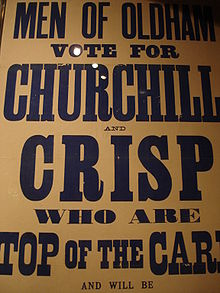 Churchill's election poster for the 1900 general election. He contested Oldham, and won one of the seats.
Churchill's election poster for the 1900 general election. He contested Oldham, and won one of the seats.
Early years in Parliament
Churchill stood again for the seat of Oldham at the 1900 general election. After winning the seat, he went on a speaking tour throughout Britain and the United States, raising £10,000 for himself (about £800,000 today[55]). In Parliament, he became associated with a faction of the Conservative Party led by Lord Hugh Cecil; the Hughligans. During his first parliamentary session, he opposed the government's military expenditure[56] and Joseph Chamberlain's proposal of extensive tariffs, which were intended to protect Britain's economic dominance. His own constituency effectively deselected him, although he continued to sit for Oldham until the next general election. After the Whitsun recess in 1904 he crossed the floor to sit as a member of the Liberal Party. As a Liberal, he continued to campaign for free trade. When the Liberals took office with Henry Campbell-Bannerman as prime minister, in December 1905, Churchill became Under-Secretary of State for the Colonies dealing mainly with South Africa after the Boer War. From 1903 until 1905, Churchill was also engaged in writing Lord Randolph Churchill, a two-volume biography of his father which was published in 1906 and received much critical acclaim.[57]
Following his deselection in the seat of Oldham, Churchill was invited to stand for Manchester North West. He won the seat at the 1906 general election with a majority of 1,214 and represented the seat for two years, until 1908.[58] When Campbell-Bannerman was succeeded by Herbert Henry Asquith in 1908, Churchill was promoted to the Cabinet as President of the Board of Trade.[49] Under the law at the time, a newly appointed Cabinet Minister was obliged to seek re-election at a by-election; Churchill lost his seat but was soon back as a member for Dundee constituency. As President of the Board of Trade he joined newly appointed Chancellor Lloyd George in opposing First Lord of the Admiralty, Reginald McKenna's proposed huge expenditure for the construction of Navy dreadnought warships, and in supporting the Liberal reforms.[59] In 1908, he introduced the Trade Boards Bill setting up the first minimum wages in Britain,[60] In 1909, he set up Labour Exchanges to help unemployed people find work.[61] He helped draft the first unemployment pension legislation, the National Insurance Act of 1911.[62] As a supporter of eugenics, he participated in the drafting of the Mental Deficiency Act 1913, although the Act eventually passed rejected his preferred method of sterilisation of the feeble-minded in favour of their confinement in institutions.[63]
Churchill also assisted in passing the People's Budget[64] becoming President of the Budget League, an organisation set up in response to the opposition's "Budget Protest League".[65] The budget included the introduction of new taxes on the wealthy to allow for the creation of new social welfare programmes. After the budget bill was sent to the Commons in 1909 and passed, it went to the House of Lords, where it was vetoed. The Liberals then fought and won two general elections in January and December 1910 to gain a mandate for their reforms. The budget was then passed following the Parliament Act 1911 for which he also campaigned. In 1910, he was promoted to Home Secretary. His term was controversial, after his responses to the Siege of Sidney Street and the dispute at the Cambrian Colliery and the suffragettes.
In 1910, a number of coal miners in the Rhondda Valley began what has come to be known as the Tonypandy Riot.[59] The Chief Constable of Glamorgan requested troops be sent in to help police quell the rioting. Churchill, learning that the troops were already travelling, allowed them to go as far as Swindon and Cardiff but blocked their deployment. On 9 November, The Times criticised this decision. In spite of this, the rumour persists that Churchill had ordered troops to attack, and his reputation in Wales and in Labour circles never recovered.[66]
In early January 1911, Churchill made a controversial visit to the Siege of Sidney Street in London. There is some uncertainty as to whether he attempted to give operational commands, and his presence attracted much criticism. After an inquest, Arthur Balfour remarked, "he [Churchill] and a photographer were both risking valuable lives. I understand what the photographer was doing, but what was the right honourable gentleman doing?"[67] A biographer, Roy Jenkins, suggests that he went simply because "he could not resist going to see the fun himself" and that he did not issue commands.[68] Another account said the police had the miscreants – Latvian anarchists wanted for murder – surrounded in a house but Churchill, called in the Scots Guards from the Tower of London and, dressed in top hat and astrakhan collar greatcoat, directed operations. The house caught fire and Churchill prevented the fire brigade from dousing the flames so the men inside were burned to death. "I thought it better to let the house burn down rather than spend good British lives in rescuing those ferocious rascals."[69]
Churchill's proposed solution to the suffragette issue was a referendum on the issue, but this found no favour with Herbert Henry Asquith and women's suffrage remained unresolved until after the First World War.[70]
In 1911, Churchill was transferred to the office of the First Lord of the Admiralty, a post he held into the First World War. He gave impetus to several reform efforts, including development of naval aviation (he undertook flying lessons himself),[71] the construction of new and larger warships, the development of tanks, and the switch from coal to oil in the Royal Navy.[72]
First World War and the Post War Coalition
On 5 October 1914, Churchill went to Antwerp, which the Belgian government proposed to evacuate. The Royal Marine Brigade was there and at Churchill's urgings the 1st and 2nd Naval Brigades were also committed. Antwerp fell on 10 October with the loss of 2500 men. At the time he was attacked for squandering resources.[73] It is more likely that his actions prolonged the resistance by a week (Belgium had proposed surrendering Antwerp on 3 October) and that this time saved Calais and Dunkirk.[74]
Churchill was involved with the development of the tank, which was financed from naval research funds.[75] He then headed the Landships Committee which was responsible for creating the first tank corps and, although a decade later development of the battle tank would be seen as a tactical victory, at the time it was seen as misappropriation of funds.[75] In 1915, he was one of the political and military engineers of the disastrous Gallipoli landings on the Dardanelles during the First World War.[76] He took much of the blame for the fiasco, and when Prime Minister Asquith formed an all-party coalition government, the Conservatives demanded his demotion as the price for entry.[77]

For several months Churchill served in the sinecure of Chancellor of the Duchy of Lancaster. However on 15 November 1915 he resigned from the government, feeling his energies were not being used[78] and, though remaining an MP, served for several months on the Western Front commanding the 6th Battalion of the Royal Scots Fusiliers, with the rank of lieutenant colonel.[79][80] While in command he personally made 36 forays into no man's land, and his section of the front at Ploegsteert became one of the most active.[80] In March 1916, Churchill returned to England after he had become restless in France and wished to speak again in the House of Commons.[81] Future prime minister David Lloyd George acidly commented: "You will one day discover that the state of mind revealed in (your) letter is the reason why you do not win trust even where you command admiration. In every line of it, national interests are completely overshadowed by your personal concern."[82] In July 1917, Churchill was appointed Minister of Munitions, and in January 1919, Secretary of State for War and Secretary of State for Air. He was the main architect of the Ten Year Rule, a principle that allowed the Treasury to dominate and control strategic, foreign and financial policies under the assumption that "there would be no great European war for the next five or ten years".[83]
A major preoccupation of his tenure in the War Office was the Allied intervention in the Russian Civil War. Churchill was a staunch advocate of foreign intervention, declaring that Bolshevism must be "strangled in its cradle".[84] He secured, from a divided and loosely organised Cabinet, intensification and prolongation of the British involvement beyond the wishes of any major group in Parliament or the nation—and in the face of the bitter hostility of Labour. In 1920, after the last British forces had been withdrawn, Churchill was instrumental in having arms sent to the Poles when they invaded Ukraine.He was also instrumental in having para-military forces (Black and Tans & Auxiliaries) intervene in the Anglo-Irish War.[85] He became Secretary of State for the Colonies in 1921 and was a signatory of the Anglo-Irish Treaty of 1921, which established the Irish Free State. Churchill was involved in the lengthy negotiations of the treaty and to protect British maritime interests, he engineered part of the Irish Free State agreement to include three Treaty Ports—Queenstown (Cobh), Berehaven and Lough Swilly—which could be used as Atlantic bases by the Royal Navy.[86] In 1938, however, under the terms of the Chamberlain-De Valera Anglo-Irish Trade Agreement the bases were returned to the Irish Free State.
Churchill advocated the use of tear gas on Kurdish tribesmen in Iraq,[87] Though the British did consider the use of poison gas in putting down Kurdish rebellions, it was not used, as conventional bombing was considered effective.[88]
In 1923, he acted as a paid consultant for Burmah Oil (now BP plc) to lobby the British government to allow Burmah to have exclusive rights to Persian (Iraqi) oil resources, which were successfully granted.[89]
Rejoining the Conservative Party—Chancellor of the Exchequer
In September, the Conservative Party withdrew from the Coalition government following a meeting of backbenchers dissatisfied with the handling of the Chanak Crisis, a move that precipitated the looming October 1922 General Election. Churchill fell ill during the campaign, and had to have an appendicectomy. This made it difficult for him to campaign, and a further setback was the internal division that continued to beset the Liberal Party. He came only fourth in the poll for Dundee, losing to the prohibitionist Edwin Scrymgeour. Churchill later quipped that he left Dundee "without an office, without a seat, without a party and without an appendix".[58] He stood for the Liberals again in the 1923 general election, losing in Leicester, and then as an independent, first without success in a by-election in the Westminster Abbey constituency, and then successfully in the general election of 1924 for Epping. The following year, he formally rejoined the Conservative Party, commenting wryly that "anyone can rat, but it takes a certain ingenuity to re-rat."[58][90]
Churchill was appointed Chancellor of the Exchequer in 1924 under Stanley Baldwin and oversaw Britain's disastrous return to the Gold Standard, which resulted in deflation, unemployment, and the miners' strike that led to the General Strike of 1926.[91] His decision, announced in the 1924 Budget, came after long consultation with various economists including John Maynard Keynes, the Permanent Secretary to the Treasury, Sir Otto Niemeyer and the board of the Bank of England. This decision prompted Keynes to write The Economic Consequences of Mr. Churchill, arguing that the return to the gold standard at the pre-war parity in 1925 (£1=$4.86) would lead to a world depression. However, the decision was generally popular and seen as 'sound economics' although it was opposed by Lord Beaverbrook and the Federation of British Industries.[92]
Churchill later regarded this as the greatest mistake of his life. However in discussions at the time with former Chancellor McKenna, Churchill acknowledged that the return to the gold standard and the resulting 'dear money' policy was economically bad. In those discussions he maintained the policy as fundamentally political—a return to the pre-war conditions in which he believed.[93] In his speech on the Bill he said "I will tell you what it [the return to the Gold Standard] will shackle us to. It will shackle us to reality."[94]
The return to the pre-war exchange rate and to the Gold Standard depressed industries. The most affected was the coal industry. Already suffering from declining output as shipping switched to oil, as basic British industries like cotton came under more competition in export markets, the return to the pre-war exchange was estimated to add up to 10% in costs to the industry. In July 1925, a Commission of Inquiry reported generally favouring the miners, rather than the mine owners' position.[95] Baldwin, with Churchill's support proposed a subsidy to the industry while a Royal Commission prepared a further report.
That Commission solved nothing and the miners' dispute led to the General Strike of 1926, Churchill was reported to have suggested that machine guns be used on the striking miners. Churchill edited the Government's newspaper, the British Gazette, and, during the dispute, he argued that "either the country will break the General Strike, or the General Strike will break the country" and claimed that the fascism of Benito Mussolini had "rendered a service to the whole world," showing, as it had, "a way to combat subversive forces"—that is, he considered the regime to be a bulwark against the perceived threat of Communist revolution. At one point, Churchill went as far as to call Mussolini the "Roman genius... the greatest lawgiver among men."[96]
Later economists, as well as people at the time, also criticised Churchill's budget measures. These were seen as assisting the generally prosperous rentier banking and salaried classes (to which Churchill and his associates generally belonged) at the expense of manufacturers and exporters which were known then to be suffering from imports and from competition in traditional export markets,[97] and as paring the Armed Forces too heavily.[98]
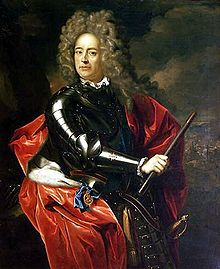 Churchill wrote a biography of his ancestor John Churchill, 1st Duke of Marlborough in the mid 1930s
Churchill wrote a biography of his ancestor John Churchill, 1st Duke of Marlborough in the mid 1930s
Political isolation
The Conservative government was defeated in the 1929 General Election. Churchill did not seek election to the Conservative Business Committee, the official leadership of the Conservative MPs. Over the next two years, Churchill became estranged from the Conservative leadership over the issues of protective tariffs and Indian Home Rule and by his political views and by his friendships with press barons, financiers and people whose characters were seen as dubious. When Ramsay MacDonald formed the National Government in 1931, Churchill was not invited to join the Cabinet. He was at the low point in his career, in a period known as "the wilderness years".[99]
He spent much of the next few years concentrating on his writing, including Marlborough: His Life and Times—a biography of his ancestor John Churchill, 1st Duke of Marlborough—and A History of the English Speaking Peoples (though the latter was not published until well after the Second World War),[99] Great Contemporaries and many newspaper articles and collections of speeches. He was one of the best paid writers of his time.[99] His political views, set forth in his 1930 Romanes Election and published as Parliamentary Government and the Economic Problem (republished in 1932 in his collection of essays "Thoughts and Adventures") involved abandoning universal suffrage, a return to a property franchise, proportional representation for the major cities and an economic 'sub parliament'.[100]
Indian independence
Churchill opposed Mohandas Gandhi's peaceful disobedience revolt and the Indian Independence movement in the 1930s, arguing that the Round Table Conference "was a frightful prospect".[101] Later reports indicate that Churchill favoured letting Gandhi die if he went on a hunger strike.[102] During the first half of the 1930s, Churchill was outspoken in his opposition to granting Dominion status to India. He was a founder of the India Defence League, a group dedicated to the preservation of British power in India. Churchill brooked no moderation. "The truth is," he declared in 1930, "that Gandhi-ism and everything it stands for will have to be grappled with and crushed."[103] In speeches and press articles in this period he forecast widespread unemployment in Britain and civil strife in India should independence be granted.[104] The Viceroy Lord Irwin, who had been appointed by the prior Conservative Government, engaged in the Round Table Conference in early 1931 and then announced the Government's policy that India should be granted Dominion Status. In this the Government was supported by the Liberal Party and, officially at least, by the Conservative Party. Churchill denounced the Round Table Conference.
At a meeting of the West Essex Conservative Association specially convened so Churchill could explain his position he said, "It is alarming and also nauseating to see Mr Gandhi, a seditious Middle Temple lawyer, now posing as a fakir of a type well-known in the East, striding half-naked up the steps of the Vice-regal palace... to parley on equal terms with the representative of the King-Emperor."[105] He called the Indian National Congress leaders "Brahmins who mouth and patter principles of Western Liberalism".[106]
Two incidents damaged Churchill's reputation greatly within the Conservative Party in this period. Both were taken as attacks on the Conservative front bench. The first was his speech on the eve of the St George by-election in April 1931. In a secure Conservative seat, the official Conservative candidate Duff Cooper was opposed by an independent Conservative. The independent was supported by Lord Rothermere, Lord Beaverbrook and their respective newspapers. Although arranged before the by-election was set,[107] Churchill's speech was seen as supporting the independent candidate and as a part of the press baron's campaign against Baldwin. Baldwin's position was strengthened when Duff Cooper won, and when the civil disobedience campaign in India ceased with the Gandhi-Irwin Pact. The second issue was a claim by Churchill that Sir Samuel Hoare and Lord Derby had pressured the Manchester Chamber of Commerce to change evidence it had given to the Joint Select Committee considering the Government of India Bill, and in doing so had breached Parliamentary privilege. He had the matter referred to the House of Commons Privilege Committee which after investigations, in which Churchill gave evidence, reported to the House that there had been no breach.[108] The report was debated on 13 June. Churchill was unable to find a single supporter in the House and the debate ended without a division.
Churchill permanently broke with Stanley Baldwin over Indian independence and never again held any office while Baldwin was prime minister. Some historians see his basic attitude to India as being set out in his book My Early Life (1930).[109] Another source of controversy about Churchill's attitude towards Indian affairs arises over what some historians term the Indian 'nationalist approach' to the Bengal famine of 1943, which has sought to place significant blame on Churchill's wartime government for the excessive mortality of up to three million people.[110][111][112] While some commentators point to the disruption of the traditional marketing system and maladministration at the provincial level,[113] Arthur Herman, author of Churchill and Gandhi, contends, 'The real cause was the fall of Burma to the Japanese, which cut off India's main supply of rice imports when domestic sources fell short...[though] it is true that Churchill opposed diverting food supplies and transports from other theatres to India to cover the shortfall: this was wartime.'[114] In response to an urgent request by the Secretary of State for India, Leo Amery, and Viceroy of India, Wavell, to release food stocks for India, Churchill responded with a telegram to Wavell asking, if food was so scarce, "why Gandhi hadn't died yet."[115] In July 1940, newly in office, he welcomed reports of the emerging conflict between the Muslim League and the Indian Congress, hoping "it would be bitter and bloody".[103]
German rearmament and conflicts in Europe and Asia
Beginning in 1932, when he opposed those who advocated giving Germany the right to military parity with France, Churchill spoke often of the dangers of Germany's rearmament.[116] He later, particularly in The Gathering Storm, portrayed himself as being for a time, a lone voice calling on Britain to strengthen itself to counter the belligerence of Germany.[117] However Lord Lloyd was the first to so agitate.[118] Churchill's attitude toward the fascist dictators was ambiguous. In 1931, he warned against the League of Nations opposing the Japanese in Manchuria "I hope we shall try in England to understand the position of Japan, an ancient state.... On the one side they have the dark menace of Soviet Russia. On the other the chaos of China, four or five provinces of which are being tortured under Communist rule".[119] In contemporary newspaper articles he referred to the Spanish Republican government as a Communist front, and Franco's army as the "Anti-red movement".[120] He supported the Hoare-Laval Pact and continued up until 1937 to praise Benito Mussolini.[121]
Speaking in the House of Commons in 1937, Churchill said "I will not pretend that, if I had to choose between communism and Nazism, I would choose communism".[122] In a 1935 essay titled "Hitler and his Choice", which was republished in his 1937 book Great Contemporaries, Churchill expressed a hope that Hitler, if he so chose, and despite his rise to power through dictatorial action, hatred and cruelty, might yet "go down in history as the man who restored honour and peace of mind to the great Germanic nation and brought it back serene, helpful and strong to the forefront of the European family circle."[123] Churchill's first major speech on defence on 7 February 1934 stressed the need to rebuild the Royal Air Force and to create a Ministry of Defence; his second, on 13 July urged a renewed role for the League of Nations. These three topics remained his themes until early 1936. In 1935, he was one of the founding members of The Focus, which brought together people of differing political backgrounds and occupations who were united in seeking "the defence of freedom and peace".[124] The Focus led to the formation of the much wider Arms and the Covenant Movement in 1936.
Churchill was holidaying in Spain when the Germans reoccupied the Rhineland in February 1936, and returned to a divided Britain. The Labour opposition was adamant in opposing sanctions and the National Government was divided between advocates of economic sanctions and those who said that even these would lead to a humiliating backdown by Britain as France would not support any intervention.[125] Churchill's speech on 9 March was measured, and praised by Neville Chamberlain as constructive. But within weeks Churchill was passed over for the post of Minister for Co-ordination of Defence in favour of the Attorney General Sir Thomas Inskip.[126] Alan Taylor called this "an appointment rightly described as the most extraordinary since Caligula made his horse a consul".[127] In June 1936, Churchill organised a deputation of senior Conservatives who shared his concern to see Baldwin, Chamberlain and Halifax. He had tried to have delegates from the other two parties and later wrote, "If the leaders of the Labour and Liberal oppositions had come with us there might have been a political situation so intense as to enforce remedial action".[128] As it was the meeting achieved little, Baldwin arguing that the Government was doing all it could, given the anti-war feeling of the electorate.[citation needed]
On 12 November Churchill returned to the topic. Speaking in the Address in Reply debate, after giving some specific instances of Germany's war preparedness, he said "The Government simply cannot make up their mind or they cannot get the prime minister to make up his mind. So they go on in strange paradox, decided only to be undecided, resolved to be irresolute, adamant for drift, solid for fluidity, all powerful for impotency. And so we go on preparing more months more years precious perhaps vital for the greatness of Britain for the locusts to eat."[citation needed]
R. R. James called this one of Churchill's most brilliant speeches in this period, Baldwin's reply sounding weak and disturbing the House. The exchange gave new encouragement to the Arms and the Covenant Movement.[129]
Abdication crisis
Main article: Abdication Crisis of Edward VIIIIn June 1936, Walter Monckton told Churchill that the rumours that King Edward VIII intended to marry Mrs Wallis Simpson were true. Churchill then advised against the marriage and said he regarded Mrs Simpson's existing marriage as a 'safeguard'.[130] In November, he declined Lord Salisbury's invitation to be part of a delegation of senior Conservative backbenchers who met with Baldwin to discuss the matter. On 25 November he, Attlee and Liberal leader Archibald Sinclair met with Baldwin, were told officially of the King's intention, and asked whether they would form an administration if Baldwin and the National Government resigned should the King not take the Ministry's advice. Both Attlee and Sinclair said they would not take office if invited to do so. Churchill's reply was that his attitude was a little different but he would support the government.[131]
The Abdication crisis became public, coming to a head in the first fortnight of December 1936. At this time Churchill publicly gave his support to the King. The first public meeting of the Arms and the Covenant Movement was on 3 December. Churchill was a major speaker and later wrote that in replying to the Vote of Thanks he made a declaration 'on the spur of the moment' asking for delay before any decision was made by either the King or his Cabinet.[132] Later that night Churchill saw the draft of the King's proposed wireless broadcast and spoke with Beaverbrook and the King's solicitor about it. On 4 December, he met with the King and again urged delay in any decision about abdication. On 5 December, he issued a lengthy statement implying that the Ministry was applying unconstitutional pressure on the King to force him to make a hasty decision.[133] On 7 December he tried to address the Commons to plead for delay. He was shouted down. Seemingly staggered by the unanimous hostility of all Members he left.[134]
Churchill's reputation in Parliament and England as a whole was badly damaged. Some such as Alistair Cooke saw him as trying to build a King's Party.[135] Others like Harold Macmillan were dismayed by the damage Churchill's support for the King had done to the Arms and the Covenant Movement.[136] Churchill himself later wrote "I was myself smitten in public opinion that it was the almost universal view that my political life was ended."[137] Historians are divided about Churchill's motives in his support for Edward VIII. Some such as A J P Taylor see it as being an attempt to 'overthrow the government of feeble men'.[138] Others such as Rhode James see Churchill's motives as entirely honourable and disinterested, that he felt deeply for the King.[139]
Return from exile
Churchill later sought to portray himself as (to some extent) an isolated voice warning of the need to rearm against Germany. While it is true that he had a small following in the House of Commons during much of the 1930s he was given privileged information by some elements within the Government, particularly by disaffected civil servants in the War Ministry. The "Churchill group" in the later half of the decade consisted only of himself, Duncan Sandys and Brendan Bracken. It was isolated from the other main factions within the Conservative Party pressing for faster rearmament and a stronger foreign policy.[140] Churchill continued to be consulted on many matters by the Government or seen as an alternative leader.[141]
Even during the time Churchill was campaigning against Indian independence, he received official and otherwise secret information. From 1932, Churchill's neighbour, Major Desmond Morton with Ramsay MacDonald's approval, gave Churchill information on German air power.[142] From 1930 onwards Morton headed a department of the Committee of Imperial Defence charged with researching the defence preparedness of other nations. Lord Swinton as Secretary of State for Air, and with Baldwin's approval, in 1934 gave Churchill access to official and otherwise secret information.
Swinton did so, knowing Churchill would remain a critic of the government, but believing that an informed critic was better than one relying on rumour and hearsay.[143] Churchill was a fierce critic of Neville Chamberlain's appeasement of Adolf Hitler[144] and in a speech to the House of Commons, he bluntly and prophetically stated, "You were given the choice between war and dishonour. You chose dishonour, and you will have war."[145]
First term as prime minister
"Winston is back"
After the outbreak of the Second World War on 3 September 1939, the day Britain declared war on Germany, Churchill was appointed First Lord of the Admiralty and a member of the War Cabinet, as he had been during the first part of the First World War. When they were informed, the Board of the Admiralty sent a signal to the Fleet: "Winston is back".[146][147] In this job, he proved to be one of the highest-profile ministers during the so-called "Phoney War", when the only noticeable action was at sea. Churchill advocated the pre-emptive occupation of the neutral Norwegian iron-ore port of Narvik and the iron mines in Kiruna, Sweden, early in the war. However, Chamberlain and the rest of the War Cabinet disagreed, and the operation was delayed until the successful German invasion of Norway.
Bitter beginnings of the war
On 10 May 1940, hours before the German invasion of France by a lightning advance through the Low Countries, it became clear that, following failure in Norway, the country had no confidence in Chamberlain's prosecution of the war and so Chamberlain resigned. The commonly accepted version of events states that Lord Halifax turned down the post of prime minister because he believed he could not govern effectively as a member of the House of Lords instead of the House of Commons. Although the prime minister does not traditionally advise the King on the former's successor, Chamberlain wanted someone who would command the support of all three major parties in the House of Commons. A meeting between Chamberlain, Halifax, Churchill and David Margesson, the government Chief Whip, led to the recommendation of Churchill, and, as a constitutional monarch, George VI asked Churchill to be prime minister. Churchill's first act was to write to Chamberlain to thank him for his support.[148]
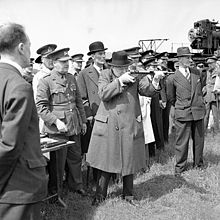 Churchill takes aim with a Sten submachine gun in June 1941. The man in the pin-striped suit and trilby on Churchill's left is his bodyguard, Walter H. Thompson
Churchill takes aim with a Sten submachine gun in June 1941. The man in the pin-striped suit and trilby on Churchill's left is his bodyguard, Walter H. Thompson
Churchill had been among the first to recognise the growing threat of Hitler long before the outset of the Second World War, and his warnings had gone largely unheeded. Although there was an element of British public and political sentiment favouring negotiated peace with a clearly ascendant Germany, among them the Foreign Secretary Lord Halifax, Churchill nonetheless refused to consider an armistice with Hitler's Germany.[149] His use of rhetoric hardened public opinion against a peaceful resolution and prepared the British for a long war.[150] Coining the general term for the upcoming battle, Churchill stated in his "finest hour" speech to the House of Commons on 18 June 1940, "I expect that the Battle of Britain is about to begin."[151] By refusing an armistice with Germany, Churchill kept resistance alive in the British Empire and created the basis for the later Allied counter-attacks of 1942–45, with Britain serving as a platform for the supply of Soviet Union and the liberation of Western Europe.
In response to previous criticisms that there had been no clear single minister in charge of the prosecution of the war, Churchill created and took the additional position of Minister of Defence. He immediately put his friend and confidant, the industrialist and newspaper baron Lord Beaverbrook, in charge of aircraft production. It was Beaverbrook's business acumen that allowed Britain to quickly gear up aircraft production and engineering that eventually made the difference in the war.[152]
Churchill's speeches were a great inspiration to the embattled British. His first speech as prime minister was the famous "I have nothing to offer but blood, toil, tears, and sweat". He followed that closely with two other equally famous ones, given just before the Battle of Britain. One included the words:
... we shall fight in France, we shall fight on the seas and oceans, we shall fight with growing confidence and growing strength in the air, we shall defend our island, whatever the cost may be, we shall fight on the beaches, we shall fight on the landing grounds, we shall fight in the fields and in the streets, we shall fight in the hills; we shall never surrender.[153]The other:
Let us therefore brace ourselves to our duties, and so bear ourselves, that if the British Empire and its Commonwealth last for a thousand years, men will still say, 'This was their finest hour'.[154]At the height of the Battle of Britain, his bracing survey of the situation included the memorable line "Never in the field of human conflict was so much owed by so many to so few", which engendered the enduring nickname The Few for the RAF fighter pilots who won it.[155] He first spoke these famous words upon his exit from No. 11 Group's underground bunker at RAF Uxbridge, now known as the Battle of Britain Bunker on 16 August 1940. One of his most memorable war speeches came on 10 November 1942 at the Lord Mayor's Luncheon at Mansion House in London, in response to the Allied victory at the Second Battle of El Alamein. Churchill stated:
This is not the end. It is not even the beginning of the end. But it is, perhaps, the end of the beginning.[156]Without having much in the way of sustenance or good news to offer the British people, he took a risk in deliberately choosing to emphasise the dangers instead.
"Rhetorical power", wrote Churchill, "is neither wholly bestowed, nor wholly acquired, but cultivated." Not all were impressed by his oratory. Robert Menzies, prime minister of Australia and himself a gifted phrase-maker, said of Churchill during the Second World War: "His real tyrant is the glittering phrase so attractive to his mind that awkward facts have to give way."[157] Another associate wrote: "He is... the slave of the words which his mind forms about ideas.... And he can convince himself of almost every truth if it is once allowed thus to start on its wild career through his rhetorical machinery."[158]
Relations with the United States
Churchill's good relationship with Franklin D. Roosevelt secured vital food, oil and munitions via the North Atlantic shipping routes.[159] It was for this reason that Churchill was relieved when Roosevelt was re-elected in 1940. Upon re-election, Roosevelt immediately set about implementing a new method of providing military hardware and shipping to Britain without the need for monetary payment. Put simply, Roosevelt persuaded Congress that repayment for this immensely costly service would take the form of defending the US; and so Lend-lease was born. Churchill had 12 strategic conferences with Roosevelt which covered the Atlantic Charter, Europe first strategy, the Declaration by the United Nations and other war policies. After Pearl Harbor was attacked, Churchill's first thought in anticipation of US help was, "We have won the war!"[160] On 26 December 1941, Churchill addressed a joint meeting of the US Congress, asking of Germany and Japan, "What kind of people do they think we are?"[161] Churchill initiated the Special Operations Executive (SOE) under Hugh Dalton's Ministry of Economic Warfare, which established, conducted and fostered covert, subversive and partisan operations in occupied territories with notable success; and also the Commandos which established the pattern for most of the world's current Special Forces. The Russians referred to him as the "British Bulldog".
Churchill's health was fragile, as shown by a mild heart attack he suffered in December 1941 at the White House and also in December 1943 when he contracted pneumonia. Despite this, he travelled over 100,000 miles (160,000 km) throughout the war to meet other national leaders. For security, he usually travelled using the alias Colonel Warden.[162]
Churchill was party to treaties that would redraw post-Second World War European and Asian boundaries. These were discussed as early as 1943. At the Second Quebec Conference in 1944 he drafted and, together with US President Franklin D. Roosevelt, signed a toned-down version of the original Morgenthau Plan, in which they pledged to convert Germany after its unconditional surrender "into a country primarily agricultural and pastoral in its character."[163] Proposals for European boundaries and settlements were officially agreed to by Harry S. Truman, Churchill, and Joseph Stalin at Potsdam. Churchill's strong relationship with Harry Truman was also of great significance to both countries. While he clearly regretted the loss of his close friend and counterpart Roosevelt, Churchill was enormously supportive of Truman in his first days in office, calling him, "the type of leader the world needs when it needs him most."[164]
Relations with the Soviet Union
When Hitler invaded the Soviet Union, Winston Churchill, a vehement anti-Communist, famously stated "If Hitler invaded Hell, I would at least make a favourable reference to the Devil in the House of Commons," regarding his policy toward Stalin.[165] Soon, British supplies and tanks were flowing to help the Soviet Union.[166]
The Casablanca Declaration
A meeting of Allied powers held in Casablanca, Morocco, January 14-23, 1943, produced what was to be known as the “Casablanca Declaration.” In attendance were Churchill, Franklin Roosevelt and Charles de Gaulle. Joseph Stalin had bowed out, citing the need for his presence in the Soviet Union to attend to the Stalingrad crisis. It was in Casablanca that it was announced that the Allies would accept nothing less than “unconditional surrender” from the Axis powers. “Unconditional surrender” has withstood the test of historical time to become a catch phrase epitomizing the implacable will and moral supremacy manifested by the Allied powers to continence nothing less than the total annihilation of Nazism in Germany. That fascism in Germany, under certain conditions, could be a system of government tolerated by and integrated into the global community was likely a negotiable consideration for the Allies. In truth, Churchill was not committed to seeing the war through to Germany’s complete capitulation. Both the United States and England hoped to come to some accommodation with Germany, which would allow the German army to help fight off the Soviet takeover of Eastern Europe. It was perceived that Communist domination was an inevitable strategy of Soviet Russia. To Churchill and the other Allied leaders, the real obstacle to preventing a mutual accommodation with Germany was Adolf Hitler. Allen Dulles, the chief of OSS intelligence in Bern, Switzerland, maintained that the “Casablanca Declaration” was “merely a piece of paper to be scrapped without further ado if Germany would sue for peace. Hitler had to go.” [167]
The settlement concerning the borders of Poland, that is, the boundary between Poland and the Soviet Union and between Germany and Poland, was viewed as a betrayal in Poland during the post-war years, as it was established against the views of the Polish government in exile. It was Winston Churchill, who tried to motivate Mikołajczyk, who was prime minister of the Polish government in exile, to accept Stalin's wishes, but Mikołajczyk refused. Churchill was convinced that the only way to alleviate tensions between the two populations was the transfer of people, to match the national borders.
As he expounded in the House of Commons on 15 December 1944, "Expulsion is the method which, insofar as we have been able to see, will be the most satisfactory and lasting. There will be no mixture of populations to cause endless trouble... A clean sweep will be made. I am not alarmed by these transferences, which are more possible in modern conditions."[168][169] However the resulting expulsions of Germans were carried out in a way which resulted in much hardship and, according to a 1966 report by the West German Ministry of Refugees and Displaced Persons, the death of over 2.1 million. Churchill opposed the effective annexation of Poland by the Soviet Union and wrote bitterly about it in his books, but he was unable to prevent it at the conferences.[170]
During October 1944, he and Eden were in Moscow to meet with the Russian leadership. At this point, Russian forces were beginning to advance into various eastern European countries. Churchill held the view that until everything was formally and properly worked out at the Yalta conference, there had to be a temporary, war-time, working agreement with regard to who would run what.[171] The most significant of these meetings were held on 9 October 1944 in the Kremlin between Churchill and Stalin. During the meeting, Poland and the Balkan problems were discussed.[172] Churchill recounted his speech to Stalin on the day:
Let us settle about our affairs in the Balkans. Your armies are in Rumania and Bulgaria. We have interests, missions, and agents there. Don't let us get at cross-purposes in small ways. So far as Britain and Russia are concerned, how would it do for you to have ninety per cent predominance in Rumania, for us to have ninety per cent of the say in Greece, and go fifty-fifty about Yugoslavia?[171]
Stalin agreed to this Percentages Agreement, ticking a piece of paper as he heard the translation. In 1958, five years after the account of this meeting was published (in The Second World War), authorities of the Soviet Union denied that Stalin accepted the "imperialist proposal".[172]
One of the conclusions of the Yalta Conference was that the Allies would return all Soviet citizens that found themselves in the Allied zone to the Soviet Union. This immediately affected the Soviet prisoners of war liberated by the Allies, but was also extended to all Eastern European refugees.[173] Aleksandr Solzhenitsyn called the Operation Keelhaul "the last secret of World War II."[174] The operation decided the fate of up to two million post-war refugees fleeing eastern Europe.[175]
Dresden bombings controversy
Main article: Bombing of Dresden in the Second World WarBetween 13–15 February 1945, British and US bombers attacked the German city of Dresden, which was crowded with German wounded and refugees.[176] Because of the cultural importance of the city, and of the number of civilian casualties close to the end of the war, this remains one of the most controversial Western Allied actions of the war. Following the bombing Churchill stated in a top secret telegram:
It seems to me that the moment has come when the question of bombing of German cities simply for the sake of increasing the terror, though under other pretexts, should be reviewed... I feel the need for more precise concentration upon military objectives such as oil and communications behind the immediate battle-zone, rather than on mere acts of terror and wanton destruction, however impressive.[177]
On reflection, under pressure from the Chiefs of Staff and in response to the views expressed by Sir Charles Portal (Chief of the Air Staff,) and Sir Arthur Harris (AOC-in-C of RAF Bomber Command), among others, Churchill withdrew his memo and issued a new one.[178][179] This final version of the memo completed on 1 April 1945, stated:
It seems to me that the moment has come when the question of the so called 'area-bombing' of German cities should be reviewed from the point of view of our own interests. If we come into control of an entirely ruined land, there will be a great shortage of accommodation for ourselves and our allies... We must see to it that our attacks do no more harm to ourselves in the long run than they do to the enemy's war effort.[178][179]
Ultimately, responsibility for the British part of the attack lay with Churchill, which is why he has been criticised for allowing the bombings to happen. The German historian Jörg Friedrich, claims that "Winston Churchill's decision to [area] bomb a shattered Germany between January and May 1945 was a war crime"[180] and writing in 2006 the philosopher A. C. Grayling questioned the whole strategic bombing campaign by the RAF presenting the argument that although it was not a war crime it was a moral crime and undermines the Allies contention that they fought a just war.[181] On the other hand, it has also been asserted that Churchill's involvement in the bombing of Dresden was based on the strategic and tactical aspects of winning the war. The destruction of Dresden, while immense, was designed to expedite the defeat of Germany. As the historian and journalist Max Hastings said in an article subtitled, "the Allied Bombing of Dresden": "I believe it is wrong to describe strategic bombing as a war crime, for this might be held to suggest some moral equivalence with the deeds of the Nazis. Bombing represented a sincere, albeit mistaken, attempt to bring about Germany's military defeat." British historian, Frederick Taylor asserts that "All sides bombed each other's cities during the war. Half a million Soviet citizens, for example, died from German bombing during the invasion and occupation of Russia. That's roughly equivalent to the number of German citizens who died from Allied raids. But the Allied bombing campaign was attached to military operations and ceased as soon as military operations ceased."[182]
The Second World War ends
In June 1944, the Allied Forces invaded Normandy and pushed the Nazi forces back into Germany on a broad front over the coming year. After being attacked on three fronts by the Allies, and in spite of Allied failures, such as Operation Market Garden, and German counter-attacks, including the Battle of the Bulge, Germany was eventually defeated. On 7 May 1945 at the SHAEF headquarters in Rheims the Allies accepted Germany's surrender. On the same day in a BBC news flash John Snagge announced that 8 May would be Victory in Europe Day.[183] On Victory in Europe Day, Churchill broadcast to the nation that Germany had surrendered and that a final cease fire on all fronts in Europe would come into effect at one minute past midnight that night.[184][185] Afterwards, Churchill told a huge crowd in Whitehall: "This is your victory." The people shouted: "No, it is yours", and Churchill then conducted them in the singing of Land of Hope and Glory. In the evening he made another broadcast to the nation asserting the defeat of Japan in the coming months.[49] The Japanese later surrendered on 15 August 1945.
As Europe celebrated peace at the end of six years of war, Churchill was concerned with the possibility that the celebrations would soon be brutally interrupted.[186] He concluded that the UK and the US must prepare for the Red Army ignoring previously agreed frontiers and agreements in Europe, and prepare to "impose upon Russia the will of the United States and the British Empire."[187] According to the Operation Unthinkable plan ordered by Churchill and developed by the British Armed Forces, the Third World War could have started on 1 July 1945 with a sudden attack against the allied Soviet troops. The plan was rejected by the British Chiefs of Staff Committee as militarily unfeasible.
Leader of the opposition
Although Churchill's role in the Second World War had generated much support for him amongst the British population, he was defeated in the 1945 election.[188] Many reasons for this have been given, key among them being that a desire for post-war reform was widespread amongst the population and that the man who had led Britain in war was not seen as the man to lead the nation in peace.[189] It was anticipated that Churchill would step down and hand over the leadership to Anthony Eden, who became his deputy after the election defeat, but Churchill (despite now being in his seventies) was determined to fight on as leader and Eden was too loyal to challenge his leadership. It would be another decade before Churchill finally did hand over the reins to Eden.[190]
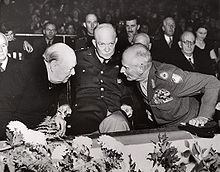 Churchill with American General Dwight D. Eisenhower and Field Marshal Bernard Law Montgomery at a meeting of NATO in October 1951, shortly before Churchill was to become prime minister for a second time
Churchill with American General Dwight D. Eisenhower and Field Marshal Bernard Law Montgomery at a meeting of NATO in October 1951, shortly before Churchill was to become prime minister for a second time
For six years he was to serve as the Leader of the Opposition. During these years Churchill continued to have an impact on world affairs. During his March 1946 trip to the United States, Churchill famously lost a lot of money in a poker game with Harry Truman and his advisors.[191] (He also liked to play Bezique, which he learned while serving in the Boer War.)
During this trip he gave his Iron Curtain speech about the USSR and the creation of the Eastern Bloc. Speaking on 5 March 1946 at Westminster College in Fulton, Missouri, he declared:
From Stettin in the Baltic to Trieste in the Adriatic, an Iron Curtain has descended across the continent. Behind that line lie all the capitals of the ancient states of Central and Eastern Europe. Warsaw, Berlin, Prague, Vienna, Budapest, Belgrade, Bucharest and Sofia, all these famous cities and the populations around them lie in what I must call the Soviet sphere.[192]
Churchill also argued strongly for British independence from the European Coal and Steel Community, which he saw as a Franco-German project. He saw Britain's place as separate from the continent, much more in-line with the countries of the Commonwealth and the Empire, and with the United States, the so-called Anglosphere.[193][194]
Churchill held the office of Deputy Lieutenant (DL) of Kent in 1949.[195]
Second term as prime minister
Return to government and the decline of the British Empire
After the General Election of 1951, Churchill again held the office of Minister of Defence between October 1951 and January 1952. He also became prime minister in October 1951, and his third government—after the wartime national government and the brief caretaker government of 1945—lasted until his resignation in April 1955. His domestic priorities in his last government were overshadowed by a series of foreign policy crises, which were partly the result of the continued decline of British military and imperial prestige and power. Being a strong proponent of Britain as an international power, Churchill would often meet such moments with direct action. One example was his dispatch of British troops to Kenya to deal with the Mau Mau rebellion.[196] Trying to retain what he could of the Empire, he once stated that, "I will not preside over a dismemberment."[196]
War in Malaya
This was followed by events which became known as the Malayan Emergency. In Malaya, a rebellion against British rule had been in progress since 1948.[197] Once again, Churchill's government inherited a crisis, and Churchill chose to use direct military action against those in rebellion while attempting to build an alliance with those who were not.[49][198] While the rebellion was slowly being defeated, it was equally clear that colonial rule from Britain was no longer sustainable.[197][199]
Relations with the United States
Churchill also devoted much of his time in office to Anglo-American relations and, although Churchill did not always agree with President Dwight D. Eisenhower,[200] Churchill attempted to maintain the Special Relationship with the United States. He made four official transatlantic visits to America during his second term as prime minister.[201]
The series of strokes
Churchill had suffered a mild stroke while on holiday in the south of France in the summer of 1949. In June 1953, when he was 78, Churchill suffered a more severe stroke at 10 Downing Street. News of this was kept from the public and from Parliament, who were told that Churchill was suffering from exhaustion. He went to his country home, Chartwell, to recuperate from the effects of the stroke which had affected his speech and ability to walk.[49] He returned to public life in October to make a speech at a Conservative Party conference at Margate.[49][202] However, aware that he was slowing down both physically and mentally, Churchill retired as prime minister in 1955 and was succeeded by Anthony Eden. He suffered another mild stroke in December 1956.
Retirement and death
Elizabeth II offered to create Churchill Duke of London, but this was declined due to the objections of his son Randolph, who would have inherited the title on his father's death.[203] After leaving the premiership, Churchill spent less time in parliament until he stood down at the 1964 General Election. As a mere "back-bencher," Churchill spent most of his retirement at Chartwell and at his home in Hyde Park Gate, in London.[49]
In the 1959 General Election Churchill's majority fell by more than a thousand, since many young voters in his constituency did not support an 85-year-old who could only enter the House of Commons in a wheelchair. As his mental and physical faculties decayed, he began to lose the battle he had fought for so long against the "black dog" of depression.[49]
There was speculation that Churchill may have had Alzheimer's disease in his last years, although others maintain that his reduced mental capacity was merely the result of a series of strokes. In 1963, US President John F. Kennedy, acting under authorisation granted by an Act of Congress, proclaimed him an Honorary Citizen of the United States,[204] but he was unable to attend the White House ceremony.[205]
Despite poor health, Churchill still tried to remain active in public life, and on St George's Day 1964, sent a message of congratulations to the surviving veterans of the 1918 Zeebrugge Raid who were attending a service of commemoration in Deal, Kent, where two casualties of the raid were buried in the Hamilton Road Cemetery. On 15 January 1965, Churchill suffered a severe stroke that left him gravely ill. He died at his London home nine days later, at age 90, on the morning of Sunday 24 January 1965, 70 years to the day after his father's death.[205]
Funeral
By decree of the Queen, his body lay in state for three days and a state funeral service was held at St Paul's Cathedral on 30 January 1965.[206] Unusually, the Queen attended the funeral.[207] As his lead-lined coffin passed up the River Thames from Tower Pier to Festival Pier on the MV Havengore, dockers lowered their crane jibs in a salute.[208]
The Royal Artillery fired the 19-gun salute due a head of government, and the RAF staged a fly-by of sixteen English Electric Lightning fighters. The coffin was then taken the short distance to Waterloo station where it was loaded onto a specially prepared and painted carriage as part of the funeral train for its rail journey to Handborough,[209] seven miles north-west of Oxford. The funeral also saw one of the largest assemblages of statesmen in the world.[1]
The funeral train of Pullman coaches carrying his family mourners was hauled by Battle of Britain class steam locomotive No. 34051 Winston Churchill. In the fields along the route, and at the stations through which the train passed, thousands stood in silence to pay their last respects. At Churchill's request, he was buried in the family plot at St Martin's Church, Bladon, near Woodstock, not far from his birthplace at Blenheim Palace. Churchill's funeral van—Southern Railway van S2464S—is now part of a preservation project with the Swanage Railway, having been repatriated to the UK in 2007 from the US, to where it had been exported in 1965.[210]
Later in 1965 a memorial to Churchill, cut by the engraver Reynolds Stone, was placed in Westminster Abbey.
Churchill as artist, historian, and writer
Winston Churchill was an accomplished artist and took great pleasure in painting, especially after his resignation as First Lord of the Admiralty in 1915.[211] He found a haven in art to overcome the spells of depression, or as he termed it, the "Black Dog", which he suffered throughout his life. As William Rees-Mogg has stated, "In his own life, he had to suffer the 'black dog' of depression. In his landscapes and still lives there is no sign of depression."[212] Churchill was persuaded and taught to paint by his artist friend, Paul Maze, whom he met during the First World War. Maze was a great influence on Churchill's painting and became a lifelong painting companion.[213] He is best known for his impressionist scenes of landscape, many of which were painted while on holiday in the South of France, Egypt or Morocco.[212] He continued his hobby throughout his life and painted hundreds of paintings, many of which are on show in the studio at Chartwell as well as private collections.[214] Some of his paintings can today be seen in the Wendy and Emery Reves Collection at the Dallas Museum of Art. Emery Reves and Winston Churchill indeed were close friends[215] and Churchill would often visit Emery and his wife in their villa in the South of France (villa La Pausa, originally built in 1927 for Gabrielle "Coco" Chanel). The villa was rebuilt within the museum in 1985 with a gallery of paintings and memorabilia from Sir Winston Churchill.[216][217] Most of his paintings are oil-based and feature landscapes, but he also did a number of interior scenes and portraits.
Due to obvious time constraints, Churchill attempted only one painting during the Second World War. He completed the painting from the tower of the Villa Taylor in Marrakesh.[218]
Despite his lifelong fame and upper-class origins, Churchill always struggled to keep his income at a level that would fund his extravagant lifestyle. MPs before 1946 received only a nominal salary (and in fact did not receive anything at all until the Parliament Act 1911) so many had secondary professions from which to earn a living.[219] From his first book in 1898 until his second stint as Prime Minister, Churchill's income was almost entirely made from writing books and opinion pieces for newspapers and magazines. The most famous of his newspaper articles are those that appeared in the Evening Standard from 1936 warning of the rise of Hitler and the danger of the policy of appeasement.
Churchill was also a prolific writer of books, writing a novel, two biographies, three volumes of memoirs, and several histories in addition to his many newspaper articles. He was awarded the Nobel Prize in Literature in 1953 "for his mastery of historical and biographical description as well as for brilliant oratory in defending exalted human values".[220] Two of his most famous works, published after his first premiership brought his international fame to new heights, were his six-volume memoir The Second World War and A History of the English-Speaking Peoples; a four-volume history covering the period from Caesar's invasions of Britain (55 BC) to the beginning of the First World War (1914).[221]
He was also an amateur bricklayer, building garden walls and even a cottage at Chartwell. As part of this hobby he joined the Amalgamated Union of Building Trade Workers.[222]
Honours
In addition to the honour of a state funeral, Churchill received a wide range of awards and other honours. For example, he was the first person to become an Honorary Citizen of the United States.[223]
In 1945, while Churchill was mentioned by Halvdan Koht as one of seven appropriate candidates for the Nobel Prize in Peace, the nomination went to Cordell Hull.[224]
Churchill received the Nobel Prize in Literature in 1953 for his numerous published works, especially his six-volume set The Second World War. In a 2002 BBC poll of the "100 Greatest Britons", he was proclaimed "The Greatest of Them All" based on approximately a million votes from BBC viewers.[225] Churchill was also rated as one of the most influential leaders in history by TIME.[226] Churchill College, Cambridge was founded in 1958 to memorialise him.
Honorary degrees
- University of Rochester (LLD) in 1941[227]
- Harvard University in Cambridge, Massachusetts (LLD) in 1943
- McGill University in Montreal, Canada (LLD) in 1944
- Westminster College in Fulton, Missouri 5 March 1946
- Leiden University in Leiden, Netherlands, honorary doctorate in 1946[228]
- University of Miami in Miami, Florida in 1947
- University of Copenhagen in Copenhagen, Denmark (PhD) in 1950
Ancestors
Ancestors of Winston Churchill 16. George Spencer-Churchill, 5th Duke of Marlborough 8. George Spencer-Churchill, 6th Duke of Marlborough 17. Lady Susan Stewart 4. John Spencer-Churchill, 7th Duke of Marlborough 18. George Stewart, 8th Earl of Galloway 9. Lady Jane Stewart 19. Lady Jane Bailey Paget 2. Lord Randolph Spencer-Churchill 20. Robert Stewart, 1st Marquess of Londonderry 10. Charles Vane, 3rd Marquess of Londonderry 21. Lady Frances Pratt 5. Lady Frances Vane-Stewart 22. Sir Henry Vane-Tempest, 2nd Baronet of Wynyard 11. Lady Frances Vane-Tempest 23. Anne Katherine McDonnell, 2nd Countess of Antrim 1. Winston Churchill 24. Aaron Jerome 12. Isaac Jerome 25. Elizabeth Ball 6. Leonard Walter Jerome 26. Reuben Murray 13. Aurora Murray 27. Sarah Guthrie 3. Jennie Jerome 28. Ambrose Hall 14. Ambrose Hall 29. Mehitable Beach 7. Clarissa Hall 30. David Willcox 15. Clarissa Willcox 31. Anna Baker Portrayal in film and television
Churchill has been portrayed in film and television on more than 100 occasions. Portrayals of Churchill include Dudley Field Malone (An American in Paris, 1951), Peter Sellers (The Man Who Never Was, 1956), Richard Burton (Winston Churchill: The Valiant Years, 1961), Simon Ward ("Young Winston", 1972), Warren Clarke (Jennie: Lady Randolph Churchill, 1974), Wensley Pithey (Edward and Mrs Simpson, 1978), William Hootkins (The Life and Times of David Lloyd George, 1981), Robert Hardy (War and Remembrance, 1989), Albert Finney ("The Gathering Storm", 2002), Ian Mune ("Ike: Countdown to D-Day", 2004), Rod Taylor (Inglourious Basterds, 2009), Brendan Gleeson (Into the Storm, 2009), Ian McNeice (Doctor Who, 2010 and 2011), and Timothy Spall (The King's Speech, 2010).[229]
See also
- Cultural depictions of Winston Churchill
- List of people on the cover of Time Magazine: 1920s – 14 April 1923, 11 May 1925
- Politics of the United Kingdom
- Winston Churchill Memorial Trusts
References
Notes
- ^ a b Gould, Peter (8 April 2005). "Largest Assemblage of Statesmen at funeral since Churchill". BBC News. http://news.bbc.co.uk/1/hi/world/europe/4421081.stm.
- ^ Darryl Lundy. "Rt. Hon. Sir Winston Leonard Spencer Churchill". thePeerage.com. http://www.thepeerage.com/p10620.htm#i106196. Retrieved 20 December 2007.
- ^ Jenkins, pp. 1–20
- ^ Jenkins, p. 7
- ^ "Introduction to Civil Defence in Ireland - Background". Civil Defence College (Ireland). http://www.civildefence.ie/cdweb.nsf/documents/AEEB06284977F81C80256E8A003C631F. Retrieved 28 October 2011.
- ^ DOWN RATRA ROAD – Fifty Years of Civil Defence in Ireland” by Padraic O’Farrell. Published by The Stationery Office, Dublin. © Government of Ireland 2000
- ^ JORDAN ANTHONY J. 'CHURCHILL - A FOUNDER OF MODERN IRELAND 2 Westport Books 1995 pp. 11-12
- ^ a b c d Lt Churchill: 4th Queen's Own Hussars, The Churchill Centre. Retrieved 28 August 2009.
- ^ Jenkins, pp. 10–11
- ^ Jenkins, p. 10
- ^ Haffner, p. 32
- ^ "Churchill's teeth sell for almost $24,000". http://www.thehistoryblog.com/archives/6954.
- ^ Oliver, Robert Tarbell (1987-10). Public speaking in the reshaping of.... Google books. ISBN 9780874133158. http://books.google.com/?id=Fb3PKOd6A2cC&pg=PA162. Retrieved 12 April 2010.
- ^ "Personal Life". The Churchill Centre. http://www.winstonchurchill.org/learn/reference/frequently-asked-questions-faq/personal-life. Retrieved 28 August 2009.
- ^ Jenkins, p. 73, quoting HW Massingham in the Daily News
- ^ Soames, Mary: Speaking for Themselves: The Personal Letters of Winston and Clementine Churchill. p. 1
- ^ Soames p. 6
- ^ Soames pp. 14–15
- ^ Soames p. 17
- ^ Edwards 1987, p.12
- ^ Soames pp. 18, 22, 25
- ^ Soames pp. 40, 44
- ^ Soames p. 105
- ^ Soames p. 217
- ^ Soames pp. 239, 241
- ^ Soames p. 262
- ^ Crowhurst, Richard (2006). "Chartwell: Churchill's House of Refuge". Moira Allen. http://www.timetravel-britain.com/06/Oct/chartwell.shtml. Retrieved 9 January 2008.
- ^ Jenkins, pp. 20–21
- ^ Jenkins, pp. 21–45
- ^ G. K. Lewis. "On the character and achievement of Sir Winston Churchill". The Canadian Journal of Economics and Political Science, Vol 23, No. 2 May 1957 (May, 1957): 173–194.
- ^ Churchill, Winston S. 1951 The Second World War, Volume 5: Closing the Ring. Houghton Miffin Edition. Bantam Books, New York No ISBN or other number provided. p. 606. "Prime Minister to Foreign Secretary 5. Feb (19)44. Your minute about raising certain legations to the status of embassy. I must say that Cuba has as good a claim as some other places–'la perla de Las Antillas'. Great offence will be given if all the others have it and this large, rich, beautiful island, the home of the cigar, is denied. Surely Cuba has much more claim than Venezuela. You will make a bitter enemy if you leave them out, and after a bit you will be forced to give them what you have given to the others."
- ^ Jenkins p. 29
- ^ T. E. C. Jr. M.D. (5 November 1977). "Winston Churchill's Poignant Description of the Death of his Nanny". PEDIATRICS Vol. 60 No.: 752.
- ^ R. V. Jones (1966). "Winston Leonard Spencer Churchill. 1874–1965". Biographical Memoirs of Fellows of the Royal Society, Vol. 12, Nov., 1966 (Nov., 1966) 12: 34–105. doi:10.1098/rsbm.1966.0003. JSTOR 769525.
- ^ Sir Winston S. Churchill. "The Story Of The Malakand Field Force – An Episode of Frontier War". arthursclassicnovels.com. Archived from the original on 14 July 2007. http://web.archive.org/web/20070714183801/http://arthursclassicnovels.com/arthurs/churchill/mkdff10.html. Retrieved 17 March 2007.
- ^ a b "Two opposition views of Afghanistan: British activist and Dutch MP want to know why their countries are participating in a dangerous adventure". Spectrazine. 20 March 2006.
- ^ Churchill, Winston (October 2002). My Early Life. Eland Publishing Ltd. p. 143. ISBN 0-907871-62-3.
- ^ "Churchill On The Frontier – Mamund Valley III". UK Commentators. 11 December 2004.
- ^ Jenkins, pp. 29–31
- ^ "Youth: 1874–1900". Sir Winston Churchill. http://www.winstonchurchill.org/learn/biography/timelines/youth-1874-19006. Retrieved 28 August 2009.[dead link]
- ^ Jenkins, p. 40
- ^ Brighton, Terry, The Last Charge: the 21st Lancers and the Battle of Omdurman. Marlborough: Crowood, 1998. ISBN 1861261896
- ^ Jenkins, pp. 55–62
- ^ Jenkins, pp. 61–62
- ^ Jenkins, pp. 62–64
- ^ "FinestHour" (PDF). Journal of the Churchill Center and Societies, Summer 2005. Archived from the original on 2009-04-27. http://www.webcitation.org/5gLRyppkK. Retrieved 2 August 2007.
- ^ "FinestHour" (PDF). Journal of the Churchill Center and Societies, Summer 2005. http://www.winstonchurchill.org/images/finesthour/Vol.01%20No.127.pdf. Retrieved 28 August 2009.[dead link]
- ^ Jenkins, pp. 45–50
- ^ a b c d e f g h Gilbert, Martin (2001). Churchill: A Study in Greatness (one volume edition). London: Pimlico. ISBN 978-0-7126-6725-8.
- ^ Jenkins, p. 69
- ^ "Churchill's Commissions and Military Attachments, The Churchill Centre". Winstonchurchill.org. http://www.winstonchurchill.org/learn/reference/commissions-and-military-attachments. Retrieved 12 April 2010.
- ^ a b "Sir Winston Churchill: Biography: Chronological Summary, Churchill College". Chu.cam.ac.uk. 6 March 2009. http://www.chu.cam.ac.uk/archives/churchill_papers/biography/churchill_chronology.php. Retrieved 9 August 2009.
- ^ Jenkins pp. 301–02
- ^ T Benn et al. (2001). "Churchill Remembered: Recollections by Tony Benn MP, Lord Carrington, Lord Deedes and Mary Soames". Transactions of the Royal Historical Society 11 (11): 393–414 [404]. doi:10.1017/S0080440101000202. JSTOR 3679430.
- ^ UK CPI inflation numbers based on data available from Lawrence H. Officer (2010) "What Were the UK Earnings and Prices Then?" MeasuringWorth.
- ^ Jenkins, pp. 74–76
- ^ Jenkins, p. 101
- ^ a b c Hall, Douglas J.. "Churchill's Elections". The Churchill Centre. http://www.winstonchurchill.org/learn/reference/churchills-elections. Retrieved 28 August 2009.
- ^ a b Toye, Richard (2007). Lloyd George and Churchill: Rivals for Greatness. London: Macmillan. ISBN 978-1-4050-4896-5.
- ^ Churchill, Randolph. Winston S. Churchill: Young Statesman. (c) 1967 C & T Publications: pp. 287–89
- ^ Jenkins, pp. 150–51
- ^ Jenkins, p. 152
- ^ Martin Gilbert, Churchill and Eugenics, 2009. online text
- ^ Jenkins, pp. 157–66
- ^ Jenkins, p. 161
- ^ Churchill, Randolph. Winston S. Churchill: Young Statesman. (c) 1967 C & T Publications pp. 359–65
- ^ Churchill, Randolph. Winston S. Churchill: Young Statesman. (c) 1967 C & T Publications: p. 395
- ^ Jenkins, p. 194
- ^ Campbell, Duncan (9 August 2011). "What next to tackle the riots? Curfew? Water cannon? The army?". The Guardian (London). http://www.guardian.co.uk/commentisfree/2011/aug/09/riots-curfew-water-cannon?INTCMP=SRCH. Retrieved 28 October 2011.
- ^ Jenkins, p. 186
- ^ Churchill took flying lessons, 1911, The Aerodrome.com
- ^ Naval innovation: from coal to oil, Erik J. Dahl, Joint Force Quarterly, 2000
- ^ The World Crisis (new edition), Odhams 1938, p. 323
- ^ Robert Rhode James. Churchill: A Study in Failure. Pelican, 1973, p. 80
- ^ a b "The First World War, The development of the Tank, sponsored by Winston Churchill". http://www.firstworldwar.com/weaponry/tanks.htm. Retrieved 16 December 2007.
- ^ Callwell, C.E. (2005). Dardanelles, a study of the strategical and certain tactical aspects of the Dardanelles campaign. London: Naval & Military Press Ltd. ISBN 978-1-84574-273-7.
- ^ Jenkins, pp. 282–88
- ^ Jenkins, p. 287
- ^ Jenkins, p. 301
- ^ a b "20th and early 21st Century – British Army Website". Army.mod.uk. http://www.army.mod.uk/infantry/regiments/4598.aspx. Retrieved 3 April 2011.
- ^ Jenkins, p. 309
- ^ "The greatest 20th century beneficiary of popular mythology has been the cad Churchill", Kevin Myers, Independent.ie
- ^ Ferris, John. Treasury Control, the Ten Year Rule and British Service Policies, 1919–1924. The Historical Journal, Vol. 30, No. 4. (Dec., 1987), pp. 859–83
- ^ Jeffrey Wallin with Juan Williams (4 September 2001). "Cover Story: Churchill's Greatness". Churchill Centre. Archived from the original on 16 December 2003. http://web.archive.org/web/20031216033237/http://www.winstonchurchill.org/i4a/pages/index.cfm?pageid=282. Retrieved 26 February 2007.
- ^ Anthony J. Jordan (April 1995). Churchill, a founder of modern Ireland. Westport Books. pp. 70–75. ISBN 978-0-9524447-0-1. http://books.google.com/books?id=OfmFAAAAIAAJ. Retrieved 21 September 2011.
- ^ Jenkins, pp. 361–65
- ^ See Jonathan Glancey Glancey, Jonathan (19 April 2003). "Gas, chemicals, bombs: Britain has used them all before in Iraq". The Guardian (London). http://www.guardian.co.uk/world/2003/apr/19/iraq.arts. Retrieved 3 February 2009. and Johann Hari "Our Infantile Search for Heroic Leaders". The Independent (London). 26 June 2008. http://www.independent.co.uk/opinion/commentators/johann-hari/johann-hari-our-infantile-search-for-heroic-leaders-854278.html. Retrieved 3 February 2009.
- ^ Bhattacharya, Sutapas (1999). The oneness/otherness mystery. Motilal Banarsidass Publ. p. 244. ISBN 9788120816541. http://books.google.com/?id=_JnQWzQlMN8C&pg=RA4-PA244&dq=churchill+kurds+gas&q=churchill%20kurds%20gas.
- ^ "The greatest 20th century beneficiary of popular mythology has been the cad Churchill - Kevin Myers, Columnists". Independent.ie. http://www.independent.ie/opinion/columnists/kevin-myers/the-greatest-20th-century-beneficiary-of-popular-mythology-has-been-the-cad-churchill-1876680.html. Retrieved 2011-08-09.
- ^ "Winston Churchill and Parliamentary Democracy". Churchill Society for the Advancement of Parliamentary Democracy. http://www.churchillsociety.org/CMS%20-%20Parliamentary%20Democracy.htm. Retrieved 4 May 2008.
- ^ Budget Blunders: Mr Churchill and the Gold Standard (1925), BBC News. Retrieved 02-12-2007.
- ^ James p. 207
- ^ James p. 206
- ^ "Speeches – Gold Standard Bill". The Churchill Centre. 4 May 1925. http://www.winstonchurchill.org/learn/speeches/speeches-of-winston-churchill/115-gold-standard-bill. Retrieved 28 August 2009.
- ^ Jenkins, p. 405
- ^ Picknett, Lynn, Prince, Clive, Prior, Stephen and Brydon, Robert (2002). War of the Windsors: A Century of Unconstitutional Monarchy, p. 78. Mainstream Publishing. ISBN 1-84018-631-3.
- ^ H Henderson The Interwar Years and other papers. Clarendon Press
- ^ James p 22 212
- ^ a b c Gilbert, Martin (2004). Winston Churchill: The Wilderness Years. London: Pimlico. ISBN 978-1-84413-418-2.
- ^ Books Written by Winston Churchill (see Amid these Storms), The Churchill Centre, 2007
- ^ 247 House of Commons Debates 5s col 755
- ^ "Churchill took hardline on Gandhi". BBC News. 1 January 2006. http://news.bbc.co.uk/2/hi/south_asia/4573152.stm. Retrieved 12 April 2010.
- ^ a b Kevin Myers. "Seventy years on and the soundtrack to the summer of 1940 is filling Britain's airwaves". The Irish Independent. http://www.independent.ie/opinion/columnists/kevin-myers/kevin-myers-seventy-years-on-and-the-soundtrack-to-the-summer-of-1940-is-filling-britains-airwaves-2286560.html. Retrieved 7 November 2010.
- ^ James, p. 260
- ^ Gilbert, Martin. Winston S. Churchill: The Prophet of Truth *1922–1939. (c) 1976 by C&T Publications, Ltd: p. 618
- ^ speech on 18 March 1931 quoted in James, p. 254
- ^ James, p. 262
- ^ Rhode James, pp. 269–72
- ^ James, p. 258
- ^ Leonard A. Gordon, Review of Prosperity and Misery in Modern Bengal: The Famine of 1943–1944 by Greenough, Paul R., American Historical Review, Vol. 88, No. 4 (October 1983), p. 1051
- ^ JSTOR profile
- ^ Mukerjee, Madhusree. "History News Network | Because the Past is the Present, and the Future too". Hnn.us. http://www.hnn.us/articles/129891.html. Retrieved 2011-07-29.
- ^ Gordon, American Historical Review, p. 1051
- ^ "The Bengali Famine". Winstonchurchill.org. http://www.winstonchurchill.org/learn/in-the-media/churchill-in-the-news/575-the-bengali-famine. Retrieved 10 August 2009.
- ^ Exit Wounds, by Pankaj Mishra, The New Yorker, 13 August 2007.
- ^ James pp. 285–86
- ^ Picknett, et al., p. 75
- ^ Lord Lloyd and the decline of the British Empire J Charmley pp. 1, 2, 213ff
- ^ James p. 329 quoting Churchill's speech in the Commons
- ^ James p. 408
- ^ A J P Taylor Beaverbrook Hamish Hamilton 1972 p. 375
- ^ Richard Holmes (2005). In the footsteps of Churchill. Basic Books. p. 185. ISBN 9780465030828. http://books.google.com/?id=Kyd945KSiQwC&pg=PA185&dq=%22I+would+choose+communism%22.
- ^ Churchill, Winston. Great Contemporaries. (c) 1937 GP Putnam Sons, Inc. New York, NY: p. 225
- ^ for a history of The Focus see E Spier Focus Wolff 1963
- ^ Harold Nicholson's letter to his wife on 13 March summed up the situation: "If we send an ultimatum to Germany she ought in all reason to climb down. But then she will not climb down and we shall have war.... The people of this country absolutely refuse to have a war. We would be faced with a general strike if we suggested such a thing. We shall therefore have to climb down ignominiously", Diaries and Letters 1930–1939 p. 249
- ^ James pp. 333–37
- ^ The Origins of the Second World War p. 153
- ^ The Gathering Storm p. 276
- ^ James p. 343
- ^ Frederick Smith, 2nd Earl of Birkenhead Walter Monckton Weidenfield and Nicholson 1969 p. 129
- ^ Middlemas K R and Barnes J Stanley Baldwin Weidenfield and Nicholson 1969 p. 999
- ^ The Gathering Storm pp. 170–71. Others including Citrine who chaired the meeting wrote that Churchill did not make such a speech. Citrine Men and Work Hutchinson 1964 p. 357
- ^ James pp. 349–51 where the text of the statement is given
- ^ Beaverbrook, Lord; Edited by A J P Taylor (1966). The Abdication of King Edward VIII. London: Hamish Hamilton.
- ^ Alistair Cook 'Edward VIII' in Six Men Bodley Head 1977
- ^ H Macmillan The Blast of War Macmillan 1970
- ^ The Gathering Storm p. 171
- ^ A J P Taylor English History (1914–1945) Hamish Hamilton 1961 p. 404
- ^ James p. 353
- ^ These factions were headed by Anthony Eden and Leo Amery Rhode James p. 428
- ^ he was so consulted and so regarded during the Abdication Crisis see footnotes above
- ^ James p. 302
- ^ Rhode James pp. 316–18
- ^ Picknett, et al., pp. 149–50
- ^ Current Biography 1942, p. 155
- ^ Churchill, Winston: "The Second World War" (abridged edition), p. 163. Pimlico, 2002. ISBN 0-7126-6702-4
- ^ Brendon, Piers. "The Churchill Papers: Biographical History". Churchill Archives Centre, Churchill College, Cambridge. http://www.chu.cam.ac.uk/archives/churchill_papers/biography/. Retrieved 26 February 2007.
- ^ Self, Robert (2006). Neville Chamberlain: A Biography, p. 431. Ashgate. ISBN 978-0-7546-5615-9.
- ^ Bungay 2000, p. 11
- ^ Jenkins, pp. 616–46
- ^ Jenkins, p. 621
- ^ Allen, Hubert Raymond. Who Won the Battle of Britain? London: Arthur Barker, 1974. ISBN 0-213-16489-2.
- ^ "We Shall Fight on the Beaches, 4 June 1940". Churchill Centre. http://www.winstonchurchill.org/learn/speeches/speeches-of-winston-churchill/128-we-shall-fight-on-the-beaches. Retrieved 20 December 2007.
- ^ "Their Finest Hour, 18 June 1940". Churchill Centre. http://www.winstonchurchill.org/learn/speeches/speeches-of-winston-churchill/122-their-finest-hour. Retrieved 20 December 2007.
- ^ Speech to the House of Commons on 20 August 1940
- ^ "Famous Quotations and Stories". Churchill Centre. http://www.winstonchurchill.org/learn/speeches/quotations. Retrieved 28 August 2009.
- ^ Menzies, Robert. "Menzies; 1941 War Diary – Churchill and the War Cabinet". http://www.oph.gov.au/menzies/churchillandthewarcabinet.htm. Retrieved 23 December 2007.[dead link]
- ^ Denson, John (1997). The Costs of War: America's Pyrrhic Victories. New York: Prentice Hall, Inc.. p. 259. ISBN 1-56000-319-7.
- ^ John Lucaks[dead link] "Churchill Offers Toil and Tears to FDR," American Heritage, Spring/Summer 2008
- ^ Stokesbury, James L. (1980). A Short History of WWII. New York: William Morrow and Company, Inc.. p. 171. ISBN 0-688-03587-6.
- ^ Prime Minister Winston Churchill's Address to the Congress of the United States 1941, IBiblio.org
- ^ Pawle, Gerald (1963). "Flight to Cairo". The War and Colonel Warden. George G. Harrap & Co. Ltd. ISBN 0856176370. http://books.google.com/?id=1Ok4AAAAIAAJ&q=colonel+warden&dq=colonel+warden. "Colonel Warden was his favourite pseudonym"
- ^ Michael R. Beschloss, (2002) The Conquerors: p. 131
- ^ Jenkins, p. 849
- ^ "The Churchill Papers: Biography". Chu.cam.ac.uk. http://www.chu.cam.ac.uk/archives/collections/churchill_papers/biography/. Retrieved 9 August 2009.
- ^ Stokesbury, James L. (1980). A Short History of WWII. New York: William Morrow and Company, Inc.. p. 159. ISBN 0-688-03587-6.
- ^ Vaughan, Hal, "Sleeping With The Enemy, Coco Chanel's Secret War," Alfred A. Knopf, 2011, p. 178
- ^ Clare Murphy WWII expulsions spectre lives on BBC.co.uk 2 August 2004
- ^ De Zayas, Alfred M. (1979) Nemesis at Potsdam: The Anglo-Americans and the Expulsion of the Germans, Routledge ISBN 0-7100-0458-3. Chapter I, p. 1 citing Churchill, Parliamentary Debates, House of Commons, vol. 406, col. 1484
- ^ Jenkins, pp. 759–63
- ^ a b Churchill, Winston (1989). The Second World War. London: Penguin. p. 852. ISBN 0-14-012836-0.
- ^ a b Resis, Albert. The Churchill-Stalin Secret "Percentages" Agreement on the Balkans, Moscow, October 1944. The American Historical Review, Vol. 83, No. 2. (Apr. 1978), pp. 368–87
- ^ A Footnote to Yalta by Jeremy Murray-Brown, Documentary at Boston University
- ^ Solzhenitsyn, Aleksandr I. The Gulag Archipelago, vol. 1. Translated by Thomas P. Whitney. New York: Harper and Row, 1974, p. 85
- ^ Jacob Hornberger Repatriation—The Dark Side of World War II. The Future of Freedom Foundation, 1995. fff.org
- ^ Taylor, Frederick; Dresden: Tuesday, 13 February 1945; US Review[dead link], New York:HarperCollins, ISBN 0-06-000676-5; UK Review, London: Bloomsbury, ISBN 0-7475-7078-7. pp. 262–64[dead link] There were an unknown number of refugees in Dresden, so the historians Matthias Neutzner, Götz Bergander and Frederick Taylor have used historical sources and deductive reasoning to estimate that the number of refugees in the city and surrounding suburbs was around 200,000 or less on the first night of the bombing.
- ^ After the devastation of Dresden by aerial bombing, and the resulting fire storm (February 1945); quoted in Where the Right Went Wrong (2004) by Patrick J. Buchanan, p. 119
- ^ a b Longmate, Norman (1983). "The Bombers", Hutchins & Co. p. 346. Harris quote as source: Public Records Office ATH/DO/4B quoted by Lord Zuckerman "From Apes to Warlords" p. 352
- ^ a b *Taylor, Frederick (2004). Dresden: Tuesday, 13 February 1945, London: Bloomsbury, ISBN 0-7475-7078-7; pp. 432–33
- ^ Luke Harding German historian provokes row over war photos in The Guardian, 21 October 2003
- ^ Grayling, A.C. (2006). Among the Dead Cities. New York: Walker Publishing Company Inc.. ISBN 0-8027-1471-4. pp. 237–38
- ^ Charles Hawley. "Dresden Bombing Is To Be Regretted Enormously", Der Spiegel online, 11 February 2005
- ^ coming home BBC Four, 9am to 9.45 am, 9–13 May 2005.
- ^ On this day 8 May 1945 BBC. Retrieved 26 December 2007.
- ^ The UK was on double summer time which was 1 hour in front of 2301 hours CET that the surrender document specified (RAF Site Diary 7/8 May).
- ^ The secret strategy to launch attack on Red Army[dead link]. Bob Fenton. Telegraph, Issue 1124. 1 October 1998.
- ^ British War Cabinet, Joint Planning Staff, Public Record Office, CAB 120/691/109040 / 002 (11 August 1945). "Operation Unthinkable: 'Russia: Threat to Western Civilization'" (online photocopy). Department of History, Northeastern University. http://www.history.neu.edu/PRO2/. Retrieved 28 June 2008.[dead link]
- ^ Picknett, et al., p. 190
- ^ Jenkins, pp. 789–94
- ^ "WWII Behind Closed Doors: Stalin, the Nazis and the West . Biographies . Anthony Eden". PBS. http://www.pbs.org/behindcloseddoors/biographies/eden.html. Retrieved 2011-08-09.
- ^ Interview: Clark Clifford. Retrieved 23 March 2009.
- ^ Churchill, Winston. "Sinews of Peace (Iron Curtain)". Churchill Centre. http://www.winstonchurchill.org/learn/speeches/speeches-of-winston-churchill/120-the-sinews-of-peace. Retrieved 26 February 2007.
- ^ Jenkins, p. 810 and pp. 819–14
- ^ "Remembrance Day 2003". Churchill Society London. http://www.churchill-society-london.org.uk. Retrieved 25 April 2007.
- ^ Biography Rt. Hon. Sir Winston Leonard Spencer Churchill – website thePeerage.com
- ^ a b Jenkins pp. 843–61
- ^ a b Harper, T.N. (2001). The End of Empire and the Making of Malaya. London: Cambridge University Press. ISBN 978-0-521-00465-7.
- ^ Stubbs, Richard (2001). Hearts and Minds in Guerilla Warfare: The Malayan Emergency 1948–1960. New York: Eastern University. 981210352X.
- ^ Ferguson, Niall (2000). Empire: How Britain Made the Modern World. London: Penguin Books Ltd. ISBN 978-0-14-100754-0.
- ^ Robert Blake; William Roger Louis (1993). Churchill. W. W. Norton & Company. p. 405. ISBN 9780393034097. http://books.google.com/?id=pVEWPfBLNxkC&pg=PA405.
- ^ Jenkins p. 847
- ^ Jenkins, pp. 868–71
- ^ Rasor, p. 205
- ^ "Winston Churchill". Pub.L. 86-6. U.S. Senate. 9 April 1963. http://www.senate.gov/reference/resources/pdf/pl8806.pdf. Retrieved 17 March 2011.
- ^ a b Jenkins, p. 911
- ^ Picknett, et al., p. 252
- ^ Remembering Winston Churchill: The State Funeral of Sir Winston Churchill, part 2, BBC Archive, accessed 5 March 2011
- ^ "Winston Churchill (1874–1965)". PortCities London. http://www.portcities.org.uk/london/server/show/ConFactFile.29/Winston-Churchill.html. Retrieved 12 January 2008.
- ^ Winston Churchill's funeral van project Swanage Railway News 2006
- ^ Winston Churchill's funeral van denied Lottery funding Swanage Railway News 2008
- ^ Jenkins p. 279
- ^ a b ReesMogg, William (22 May 2007). "Portrait of the artist with his black dog". The Times (London). http://www.timesonline.co.uk/tol/comment/columnists/william_rees_mogg/article1824692.ece. Retrieved 6 March 2008.
- ^ "Paul Maze Biography". Albanyfineart.co.uk. http://www.albanyfineart.co.uk/maze/biog.html. Retrieved 16 June 2010.
- ^ Lady Soames. "Winston Churchill the Painter". http://winstonchurchill.org/i4a/pages/index.cfm?pageID=576. Retrieved 9 January 2008.[dead link]
- ^ "Churchill and Reves". Winstonchurchill.org. http://www.winstonchurchill.org/support/the-churchill-centre/publications/chartwell-bulletin/28-oct-2010/988-churchill-and-reves. Retrieved 7 November 2010.
- ^ "25th Anniversary of Reves Collection at the Dallas Museum of Art". Dallas Art News. http://www.dallasartnews.com/2010/10/dallas-museum-of-art-celebrates-the-25th-anniversary-of-the-wendy-and-emery-reves-collection/. Retrieved 7 November 2010.
- ^ Mohr, Philip. "Reves Collection Inventory". The Emery and Wendy Reves Memorial Collection, Winston Churchill Memorial and Library in the United States, Westminster College. http://www.churchillmemorial.org/resources/Documents/RevesCollectionInventory.pdf. Retrieved 28 October 2011.
- ^ Churchill, Winston S., "The Hinge of Fate". New York: Houghton Mifflin Company 1950 p.622
- ^ "FAQ about Parliament". Parliament.uk. http://www.parliament.uk/faq/members_faq_page2.cfm. Retrieved 9 August 2009.
- ^ "Official Nobel Page". Nobelprize.org. http://nobelprize.org/nobel_prizes/literature/laureates/1953/. Retrieved 9 August 2009.
- ^ Jenkins, pp. 819–23 and pp. 525–26
- ^ Radio Times, 2011-3-12, page 130-131
- ^ Russell, Douglas (2002). The Orders, Decorations and Medals of Sir Winston Churchill. Churchill Centre.
- ^ "Record from The Nomination Database for the Nobel Prize in Peace, 1901–1956". Nobel Foundation. http://nobelprize.org/nobel_prizes/peace/nomination/nomination.php?action=show&showid=3319. Retrieved 8 June 2010.
- ^ "Poll of the 100 Greatest Britons". BBC. Archived from the original on 14 May 2006. http://web.archive.org/web/20060514084331/www.bbc.co.uk/history/programmes/greatbritons.shtml. Retrieved 22 December 2007.
- ^ "The Most Influential People of the 20th Century". Time Magazine. http://www.time.com/time/time100/time100poll.html. Retrieved 22 December 2007.[dead link]
- ^ "The Birth Throes of a Sublime Resolve". The Churchill Centre. http://www.winstonchurchill.org/learn/speeches/speeches-of-winston-churchill/568-the-birth-throes-of-a-sublime-resolve-the-old-lion-. Retrieved 9 August 2009.
- ^ Leiden University Honorary Doctrates
- ^ IMDb.com
Primary sources
- Churchill, Winston. The World Crisis. 6 vols. (1923–31); one-vol. ed. (2005). [On World War I.]
- –––. The Second World War. 6 vols. (1948–53)
- Coombs, David, ed., with Minnie Churchill. Sir Winston Churchill: His Life through His Paintings. Fwd. by Mary Soames. Pegasus, 2003. ISBN 0-7624-2731-0. [Other editions entitled Sir Winston Churchill's Life and His Paintings and Sir Winston Churchill: His Life and His Paintings. Includes illustrations of approx. 500–534 paintings by Churchill.]
- Edwards, Ron. Eastcote: From Village to Suburb (1987). Uxbridge: London Borough of Hillingdon ISBN 0907869092
- Gilbert, Martin. In Search of Churchill: A Historian's Journey (1994). [Memoir about editing the following multi-volume work.]
- –––, ed. Winston S. Churchill. An 8 volume biography begun by Randolph Churchill, supported by 15 companion vols. of official and unofficial documents relating to Churchill. 1966–
- I. Youth, 1874–1900 (2 vols., 1966);
- II. Young Statesman, 1901–1914 (3 vols., 1967);
- III. The Challenge of War, 1914–1916 (3 vols., 1973). ISBN 0-395-16974-7 (10) and ISBN 978-0-395-16974-2 (13);
- IV. The Stricken World, 1916–1922 (2 vols., 1975);
- V. The Prophet of Truth, 1923–1939 (3 vols., 1977);
- VI. Finest Hour, 1939–1941: The Churchill War Papers (2 vols., 1983);
- VII. Road to Victory, 1941–1945 (4 vols., 1986);
- VIII. Never Despair, 1945–1965 (3 vols., 1988).
- James, Robert Rhodes, ed. Winston S. Churchill: His Complete Speeches, 1897–1963. 8 vols. London: Chelsea, 1974.
- Knowles, Elizabeth. The Oxford Dictionary of Twentieth Century Quotations. Oxford, Eng.: Oxford University Press, 1999. ISBN 0-19-860103-4. ISBN 978-0-19-860103-6. ISBN 0-19-866250-5. ISBN 978-0-19-866250-1.
- Loewenheim, Francis L. and Harold D. Langley, eds; Roosevelt and Churchill: Their Secret Wartime Correspondence (1975).
Secondary sources
- Beschloss, Michael R. (2002). The Conquerors: Roosevelt, Truman and the Destruction of Hitler's Germany, 1941–1945. New York: Simon & Schuster. ISBN 9780684810270. OCLC 50315054.
- Best, Geoffrey (2003) [First published 2001]. Churchill: A Study in Greatness. Oxford: Oxford University Press. ISBN 9781852852535. OCLC 50339762.
- Blake, Robert (1997). Winston Churchill. Pocket Biographies. Stroud: Sutton Publishing. ISBN 9780750915076. OCLC 59586004.
- Blake, Robert; Louis, William Roger, eds (1992). Churchill: A Major New Reassessment of His Life in Peace and War. Oxford: Oxford University Press. ISBN 9780192823175. OCLC 30029512.
- Browne, Anthony Montague (1995). Long sunset : memoirs of Winston Churchill's last private secretary. London: Cassell. ISBN 9780304344789. OCLC 32547047.
- Charmley, John (1993). Churchill, The End of Glory: A Political Biography. London: Hodder & Stoughton. ISBN 9780151178810. OCLC 440131865.
- Charmley, John (1996). Churchill's Grand Alliance: The Anglo-American Special Relationship 1940–57. London: Hodder & Stoughton. ISBN 9780340597606. OCLC 247165348.
- Davis, Richard Harding. Real Soldiers of Fortune (1906). Early biography. Project Gutenberg etext, wikisource here "Real Soldiers of Fortune/Chapter 3 – Wikisource". En.wikisource.org. 20 October 2007. http://en.wikisource.org/wiki/Real_Soldiers_of_Fortune/Chapter_3. Retrieved 9 August 2009.
- D'Este, Carlo (2008). Warlord : a life of Winston Churchill at war, 1874–1945 (1st ed.). New York: Harper. ISBN 9780060575731. http://lccn.loc.gov/2008009272. Retrieved 26 November 2008.
- Gilbert, Martin. Churchill: A Life (1992). ISBN 0-8050-2396-8. [One-volume version of 8-volume biography.]
- Haffner, Sebastian. Winston Churchill (1967).
- Hastings, Max. Finest Years: Churchill as Warlord, 1940–45. London, HarperPress, 2009. ISBN 9780007263677
- Hennessy, P. Prime minister: the office and its holders since 1945 (2001).
- Hitchens, Christopher. "The Medals of His Defeats", The Atlantic Monthly (April 2002).
- James, Robert Rhodes. Churchill: A Study in Failure, 1900–1939 (1970).
- Jenkins, Roy. Churchill: A Biography (2001).
- Kersaudy, François. Churchill and De Gaulle (1981). ISBN 0-00-216328-4.
- Krockow, Christian. Churchill: Man of the Century. [1900–1999]. ISBN 1-902809-43-2.
- Lukacs, John. Churchill : Visionary, Statesman, Historian. New Haven: Yale University Press, 2002.
- Manchester, William. The Last Lion: Winston Spencer Churchill: Alone, 1932–1940 (1988). ISBN 0-316-54512-0.
- –––. The Last Lion: Winston Spencer Churchill: Defender of the Realm, 1940-1965 (2010).
- –––. The Last Lion: Winston Spencer Churchill: Visions of Glory, 1874–1932 (1983). ISBN 0-316-54503-1.
- Massie, Robert. Dreadnought: Britain, Germany and the Coming of the Great War. ISBN 1-84413-528-4). [Chapters 40–41 concern Churchill at Admiralty.]
- Pelling, Henry. Winston Churchill (1974). ISBN 1-84022-218-2. [Comprehensive biography.]
- Rasor, Eugene L. Winston S. Churchill, 1874–1965: A Comprehensive Historiography and Annotated Bibliography. Greenwood Press, 2000. ISBN 0-313-30546-3 [Entries include several thousand books and scholarly articles.]
- Soames, Mary, ed. Speaking for Themselves: The Personal Letters of Winston and Clementine Churchill (1998).
- Stansky, Peter, ed. Churchill: A Profile (1973) [Perspectives on Churchill by leading scholars]
- Storr, Anthony. Churchill's Black Dog and Other Phenomena of the Human Mind. HarperCollins Publishers Ltd. New Edition ed., 1997. ISBN 9780006375661
- Toye, Richard. Churchill's Empire: The World that Made Him and the World He Made. Macmillan. 2010. ISBN 9780230703841
External links
- Works by Winston Churchill at Project Gutenberg
- Winston Churchill Memorial and Library at Westminster College, Missouri
- Churchill College Biography of Winston Churchill
- FBI files on Winston Churchill
- The Real Churchill (critical) and a rebuttal
- A Rebuttal to "The Real Churchill"
- Online bibliography of books on Churchill
- Online gallery of Churchill's numerous oil paintings
- Key records about Winston Churchill at The National Archives of the United Kingdom
- Collected Churchill Podcasts and speeches
- The Churchill Centre website
- Churchill and the Great Republic Exhibition explores Churchill's relationship with the US
- War Cabinet Minutes (1942), (1942–43), (1945–46), (1946)
- Locations of correspondence and papers of Churchill at The National Archives of the UK
- The History Channel: Winston Churchill
- EarthStation1: Winston Churchill Speech Audio Archive
- Hansard 1803–2005: contributions in Parliament by Winston Churchill
- Imperial War Museum: Churchill War Rooms. Comprising the original underground War Rooms preserved since 1945, including the Cabinet Room, the Map Room and Churchill's bedroom, and the new Museum dedicated to Churchill's life.
Political offices Preceded by
The Duke of MarlboroughUnder-Secretary of State for the Colonies
1905–1908Succeeded by
Jack SeelyPreceded by
David Lloyd GeorgePresident of the Board of Trade
1908–1910Succeeded by
Sydney BuxtonPreceded by
Herbert GladstoneHome Secretary
1910–1911Succeeded by
Reginald McKennaPreceded by
Reginald McKennaFirst Lord of the Admiralty
1911–1915Succeeded by
Arthur BalfourPreceded by
Edwin Samuel MontaguChancellor of the Duchy of Lancaster
1915Succeeded by
Herbert SamuelPreceded by
Christopher AddisonMinister of Munitions
1917–1919Succeeded by
The Lord InverforthPreceded by
The Viscount MilnerSecretary of State for War
1919–1921Succeeded by
Sir Laming Worthington-EvansPreceded by
The Lord WeirSecretary of State for Air
1919–1921Succeeded by
Frederick Edward GuestPreceded by
The Viscount MilnerSecretary of State for the Colonies
1921–1922Succeeded by
The Duke of DevonshirePreceded by
Philip SnowdenChancellor of the Exchequer
1924–1929Succeeded by
Philip SnowdenPreceded by
The Earl StanhopeFirst Lord of the Admiralty
1939–1940Succeeded by
A. V. AlexanderPreceded by
Neville ChamberlainLeader of the House of Commons
1940–1942Succeeded by
Sir Stafford CrippsPrime Minister of the United Kingdom
10 May 1940 – 27 July 1945Succeeded by
Clement AttleeNew title Minister of Defence
1940–1945Preceded by
Clement AttleeLeader of the Opposition
1945–1951Prime Minister of the United Kingdom
26 October 1951 – 7 April 1955Succeeded by
Sir Anthony EdenPreceded by
Emanuel ShinwellMinister of Defence
1951–1952Succeeded by
The Earl Alexander of TunisParliament of the United Kingdom Preceded by
Walter Runciman
Alfred EmmottMember of Parliament for Oldham
with Alfred Emmott
1900–1906Succeeded by
John Bright
Alfred EmmottPreceded by
Sir William HouldsworthMember of Parliament for Manchester North West
1906–1908Succeeded by
William Joynson-HicksPreceded by
Alexander Wilkie
Edmund RobertsonMember of Parliament for Dundee
with Alexander Wilkie
1908–1922Succeeded by
Edmund Morel
Edwin ScrymgeourPreceded by
Sir Leonard LyleMember of Parliament for Epping
1924–1945Succeeded by
Leah ManningNew constituency Member of Parliament for Woodford
1945–1964Succeeded by
Patrick JenkinMilitary offices Preceded by
J H DuttonOfficer Commanding the 6th Battalion, Royal Scots Fusiliers
1915–1916Succeeded by
A D GibbParty political offices Preceded by
Neville ChamberlainLeader of the British Conservative Party
1940–1955Succeeded by
Sir Anthony EdenAcademic offices Unknown Last known title holder:Herbert Henry AsquithRector of the University of Aberdeen
1914–1918Succeeded by
The Viscount CowdrayPreceded by
Sir John GilmourRector of the University of Edinburgh
1929–1932Succeeded by
Ian Standish Monteith HamiltonPreceded by
The Viscount HaldaneChancellor of the University of Bristol
1929–1965Succeeded by
The Duke of BeaufortHonorary titles Preceded by
The Marquess of WillingdonLord Warden of the Cinque Ports
1941–1965Succeeded by
Sir Robert MenziesPreceded by
David GrenfellFather of the House
1959–1964Succeeded by
Rab ButlerPreceded by
David LoganOldest sitting Member of Parliament
February 1964 – October 1964Succeeded by
Manny ShinwellWinston Churchill Winston Churchill Writings The Story of the Malakand Field Force · Savrola · The River War · London to Ladysmith via Pretoria · Ian Hamilton's March · Lord Randolph Churchill · The World Crisis · My Early Life · Marlborough: His Life and Times · Great Contemporaries · While England Slept · The Second World War · A History of the English-Speaking PeoplesSpeeches Family Father: Lord Randolph Churchill · Mother: Lady Randolph Churchill · Brother: John Strange Spencer-Churchill · Wife: Clementine Churchill, Baroness Spencer-Churchill · Children: Diana · Randolph · Sarah · Marigold · Mary · GrandchildrenPrime Ministers of the United Kingdom Kingdom of Great Britain Walpole · Wilmington · Pelham · Newcastle · Devonshire · Newcastle · Bute · G Grenville · Rockingham · Chatham (Pitt the Elder) · Grafton · North · Rockingham · Shelburne · Portland · Pitt the YoungerUnited Kingdom Pitt the Younger · Addington · Pitt the Younger · W Grenville · Portland · Perceval · Liverpool · Canning · Goderich · Wellington · Grey · Melbourne · Wellington · Peel · Melbourne · Peel · Russell · Derby · Aberdeen · Palmerston · Derby · Palmerston · Russell · Derby · Disraeli · Gladstone · Beaconsfield (Disraeli) · Gladstone · Salisbury · Gladstone · Salisbury · Gladstone · Rosebery · Salisbury · Balfour · Campbell-Bannerman · Asquith · Lloyd George · Bonar Law · Baldwin · MacDonald · Baldwin · MacDonald · Baldwin · Chamberlain · Churchill · Attlee · Churchill · Eden · Macmillan · Douglas-Home · Wilson · Heath · Wilson · Callaghan · Thatcher · Major · Blair · Brown · CameronHome Secretaries of the United Kingdom of Great Britain of the United Kingdom Pelham · Yorke · Hawkesbury · Spencer · Liverpool · Ryder · Sidmouth · Peel · Bourne · Lansdowne · Peel · Melbourne · Duncannon · Wellington · Goulburn · Russell · Normanby · Graham · Grey · Walpole · Palmerston · Grey · Walpole · Sotheron-Estcourt · Cornewall Lewis · Grey · Walpole · Hardy · Bruce · Lowe · Cross · Harcourt · Cross · Childers · Matthews · Asquith · Ridley · Ritchie · Akers-Douglas · Gladstone · Churchill · McKenna · Simon · Samuel · Cave · Shortt · Bridgeman · Henderson · Joynson-Hicks · Clynes · Samuel · Gilmour · Simon · Hoare · Anderson · Morrison · Somervell · Ede · Fyfe · Lloyd George · Butler · Brooke · Soskice · Jenkins · Callaghan · Maudling · Carr · Jenkins · Rees · Whitelaw · Brittan · Hurd · Waddington · Baker · K. Clarke · Howard · Straw · Blunkett · C. Clarke · Reid · Smith · Johnson · May
Secretaries of State for Defence of the United Kingdom Ministers for Defence Winston Churchill · Clement Attlee · A. V. Alexander · Manny Shinwell · Winston Churchill · The Earl Alexander of Tunis · Harold Macmillan · Selwyn Lloyd · Sir Walter Monckton · Anthony Head · Duncan Sandys · Harold Watkinson · Peter ThorneycroftSecretaries of State for Defence Peter Thorneycroft · Denis Healey · The Lord Carrington · Ian Gilmour · Roy Mason · Fred Mulley · Francis Pym · John Nott · Michael Heseltine · George Younger · Tom King · Malcolm Rifkind · Michael Portillo · George Robertson · Geoff Hoon · John Reid · Des Browne · John Hutton · Bob Ainsworth · Liam Fox · Philip HammondPresidents of the Board of Trade of the United Kingdom Shaftesbury · Bridgewater · Stamford · Weymouth · Stamford · Winchilsea · Guilford · Berkeley · Suffolk · Holderness · Fitzwalter · Monson · Halifax · Sandys · Townshend · Shelburne · Hillsborough · Dartmouth · Hillsborough · Nugent · Hillsborough · Dartmouth · Sackville · Carlisle · Grantham · Sydney · Liverpool · Montrose · Auckland · Bathurst · Clancarty · Robinson · Huskisson · Grant · Vesey-Fitzgerald · Herries · Auckland · Thomson · Baring · Thomson · Labouchere · Ripon · Gladstone · Dalhousie · Clarendon · Labouchere · Henley · Cardwell · Stanley · Henley · Dnoughmore · Gibson · Northcote · Richmond · Bright · Parkinson-Fortescue · Adderley · Sandon · Chamberlain · Richmond · Stanhope · Mundella · Stanley · Hicks Beach · Mundella · Bryce · Ritchie · Balfour · Salisbury · Lloyd George · Churchill · Buxton · Burns · Runciman · Stanley · Geddes · Horne · Baldwin · Cunliffe-Lister · Graham · Cunliffe-Lister · Runciman · Stanley · Duncan · Lyttelton · Duncan · Llewellin · Dalton · Lyttelton · Cripps · Wilson · Shawcross · Thorneycroft · Eccles · Maulding · Erroll · Heath · Jay · Crosland · Mason · Noble · Davies · Walker · Benn · Varley · Joseph · Jenkin · Shore · Dell · Smith · Nott · Biffen · Cockfield · Parkinson · Tebbit · Brittan · Channon · Young · Ridley · Lilley · Heseltine · Lang · Beckett · Mandelson · Byers · Hewitt · Johnson · Darling · Hutton · Mandelson · CableLeaders of the House of Commons Walpole · Sandys · Pelham · Robinson · H Fox · Pitt the Elder · Vacant (Caretaker Ministry) · Pitt the Elder · Grenville · H Fox · Grenville · Conway · North · C Fox · Townshend · (C Fox/North) · Pitt the Younger · Addington · Pitt the Younger · C Fox · Howick · Perceval · Castlereagh · Canning · Huskisson · Peel · Althorp · Peel · Russell · Disraeli · Russell · Palmerston · Disraeli · Palmerston · Gladstone · Disraeli · Gladstone · Northcote · Gladstone · Hicks-Beach · Gladstone · R Churchill · Smith · Balfour · Gladstone · Harcourt · Balfour · Campbell-Bannerman · Asquith · Bonar Law · A Chamberlain · Bonar Law · Baldwin · MacDonald · Baldwin · MacDonald · Baldwin · MacDonald · Baldwin · N Chamberlain · W Churchill · Cripps · Eden · Morrison · Chuter Ede · Crookshank · Butler · Macleod · Lloyd · Bowden · Crossman · Peart · Whitelaw · Carr · Prior · Short · Foot · St John-Stevas · Pym · Biffen · Wakeham · Howe · MacGregor · Newton · Taylor · Beckett · Cook · Reid · Hain · Hoon · Straw · Harman · YoungDavid Lloyd George · Edwin Samuel Montagu · Christopher Addison · Winston Churchill · Lord IverforthFagg · Turgis · Musgrave · Strangeways · Onslow · Erle · Vaughan · Vaughan · Powlett · Isham · Turner · Bradshaigh · Ashe · Cartwright · Shuttleworth · Gybbon · Rushout · Aislabie · FitzRoy-Scudamore · Nugent · Frederick · Ellis · Drake · Stephens · Tudway · Aubrey · Smith · Byng · Williams-Wynn · Harcourt · Burrell · Lowther · Williams · Lowry-Corry · Weld-Forester · Talbot · Villiers · Mowbray · Beach · Hicks Beach · Finch · Campbell-Bannerman · Kennaway · Burt · O'Connor · Lloyd George · Turnour · O'Neill · Grenfell · Churchill · Butler · Turton · Strauss · Parker · Callaghan · Braine · Heath · Dalyell · Williams · TapsellConservative Party History History of the Conservative Party · History of conservatism in Great Britain · Tory Party
Leadership Sir Robert Peel · The Lord George Bentinck · Marquess of Granby · vacant (1848–1849) · Benjamin Disraeli / Marquess of Granby / John Charles Herries · Benjamin Disraeli · Sir Stafford Northcote · Sir Michael Hicks Beach · The Lord Randolph Churchill · W.H. Smith · Arthur Balfour · Andrew Bonar Law · Sir Austen Chamberlain
Andrew Bonar Law · Stanley Baldwin · Neville Chamberlain · Sir Winston Churchill · Sir Anthony Eden · Harold Macmillan · Sir Alec Douglas-Home · Edward Heath · Margaret Thatcher · John Major · William Hague · Iain Duncan Smith · Michael Howard · David Cameron
Steel-Maitland · Younger · Jackson · Davidson · Chamberlain · Baird · Hacking · Dugdale · Assheton · Woolton · Poole · Hailsham · Butler · Macleod · Blakenham · du Cann · Barber · Thomas · Carrington · Whitelaw · Thorneycroft · Parkinson · Gummer · Tebbit · Brooke · Baker · Patten · Fowler · Hanley · Mawhinney · Parkinson · Ancram · Davis · May · Fox · Saatchi · Maude · Spelman · Pickles · Warsi · Feldman
Leadership elections Related organisations 1922 Committee · Association of Conservative Clubs · Atlantic Bridge · Bow Group · Bruges Group · Carlton Club · C-Change · Centre for Policy Studies · Centre for Social Justice · Conservative Animal Welfare Group · Conservative Campaign Headquarters · Conservative Christian Fellowship · Conservative Business Relations · Conservative Countryside Forum · Conservative Disability Group · Conservative Europe Group · Conservative Friends of Gibraltar · Conservative Friends of Israel · Conservative Friends of Turkey · Conservative Future · Conservative History Group · Conservative Humanist Association · Conservative Mainstream · Conservative Medical Society · Conservative Muslim Forum · Conservative National Education Society · Conservative National Property Advisory Committee · Conservative Party Archive Trust · Conservative Research Department · Conservative Rural Action Group · Conservative Technology Forum · Conservative Trade Unionists · Conservative Transport Group · Conservative Way Forward · Conservative Women National Committee · Conservatives 4 Cities · Conservatives at Work · Conservatives for International Travel · Conservatives in Northern Ireland · Cornerstone Group · Countryside Alliance · European Democrats · European Foundation · Fresh Start · International Democrat Union · LGBTory · Macleod Group · Margaret Thatcher Foundation · Monday Club · 92 Group · No Campaign · No Turning Back · Policy Exchange · Society of Conservative Lawyers · Tory Green Initiative · Tory Reform Group · Ulster Unionist Party · Renewing One Nation · Young Britons' Foundation
Prime Minister
Minister of DefenceWinston Churchill (1940–1945)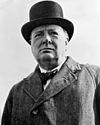
Deputy Prime Minister Lord President of the Council Lord Privy Seal Chancellor of the Exchequer Foreign Secretary Home Secretary Minister of Aircraft Production Secretary of State for Dominion Affairs Minister of Labour and National Service Minister Resident Middle East Minister without Portfolio Minister of Reconstruction Minister of State Lord Beaverbrook (1941)Minister of Supply Minister of Production Lord President of the Council 
Lord Privy Seal Chancellor of the Exchequer Foreign Secretary Home Secretary First Lord of the Admiralty Minister of Agriculture, Fisheries and Food Secretary of State for Air Secretary of State for the Colonies Secretary of State for Dominion Affairs Minister of Education Secretary of State for India and Burma Minister of Labour and National Service Minister of Production
President of the Board of TradeSecretary of State for Scotland Secretary of State for War Prime Minister
First Lord of the TreasurySir Winston Churchill (1951–55)
Lord Chancellor Lord President of the Council Lord Privy Seal Chancellor of the Exchequer Foreign Secretary Home Secretary
Welsh SecretaryMinister of Agriculture and Fisheries Secretary of State for the Colonies Minister for Coordination of Transport, Fuel and Power Minister of Defence Minister of Education Minister of Health Ministry of Housing and Local Government Minister of Labour and National Service Chancellor of the Duchy of Lancaster Minister of Materials Paymaster General Secretary of State for Scotland Prime Minister
Leader of the House of Commons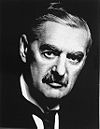
Lord Privy Seal Chancellor of the Exchequer Foreign Secretary Secretary of State for War Secretary of State for Air First Lord of the Admirality Winston Churchill (1939–1940)Minister for Coordination of Defence Minister without Portfolio 1940s Yalta Conference · Operation Unthinkable · Potsdam Conference · Gouzenko Affair · War in Vietnam (1945–1946) · Iran crisis of 1946 · Greek Civil War · Corfu Channel Incident · Restatement of Policy on Germany · First Indochina War · Truman Doctrine · Asian Relations Conference · Marshall Plan · Czechoslovak coup d'état of 1948 · Tito–Stalin split · Berlin Blockade · Western betrayal · Iron Curtain · Eastern Bloc · Chinese Civil War (Second round)1950s Korean War · 1953 Iranian coup d'état · Uprising of 1953 in East Germany · 1954 Guatemalan coup d'état · Partition of Vietnam · First Taiwan Strait Crisis · Geneva Summit (1955) · Poznań 1956 protests · Hungarian Revolution of 1956 · Suez Crisis · Sputnik crisis · Second Taiwan Strait Crisis · Cuban Revolution · Kitchen Debate · Asian–African Conference · Bricker Amendment · McCarthyism · Operation Gladio · Hallstein Doctrine1960s Congo Crisis · Sino–Soviet split · 1960 U-2 incident · Bay of Pigs Invasion · Berlin Wall · Cuban Missile Crisis · Vietnam War · 1964 Brazilian coup d'état · United States occupation of the Dominican Republic (1965–1966) · South African Border War · Rhodesian Bush War · Transition to the New Order · Domino theory · ASEAN Declaration · Laotian Civil War · Greek military junta of 1967–1974 · Six-Day War · War of Attrition · Cultural Revolution · Sino-Indian War · Prague Spring · Goulash Communism · Sino–Soviet border conflict1970s Détente · Nuclear Non-Proliferation Treaty · Black September in Jordan · Cambodian Civil War · Realpolitik · Ping Pong Diplomacy · Four Power Agreement on Berlin · 1972 Nixon visit to China · 1973 Chilean coup d'état · Yom Kippur War · Strategic Arms Limitation Talks · Angolan Civil War · Mozambican Civil War · Ogaden War · Sino-Albanian split · Cambodian–Vietnamese War · Sino-Vietnamese War · Iranian Revolution · Operation Condor · Bangladesh Liberation War · Korean Air Lines Flight 9021980s Soviet war in Afghanistan · 1980 and 1984 Summer Olympics boycotts · Solidarity (Soviet reaction) · Contras · Central American crisis · RYAN · Korean Air Lines Flight 007 · Able Archer 83 · Star Wars · Invasion of Grenada · People Power Revolution · Tiananmen Square protests of 1989 · United States invasion of Panama · Fall of the Berlin Wall · Revolutions of 1989 · Glasnost · Perestroika1990s Foreign
policyIdeologies Capitalism (Chicago school · Keynesianism · Monetarism · Neoclassical economics · Supply-side economics · Thatcherism · Reaganomics) · Communism (Marxism–Leninism · Castroism · Eurocommunism · Guevarism · Juche · Left communism · Maoism · Stalinism · Titoism · Trotskyism) · Liberal democracy · Social democracyOrganizations Propaganda Races See also Brinkmanship · NATO–Russia relations · Soviet and Russian espionage in U.S. · Soviet Union – United States relations · US–Soviet summitsNotable figures of the Cold WarSoviet Union Joseph Stalin · Vyacheslav Molotov · Andrei Gromyko · Nikita Khrushchev · Anatoly Dobrynin · Leonid Brezhnev · Alexei Kosygin · Yuri Andropov · Konstantin Chernenko · Mikhail Gorbachev · Nikolai Ryzhkov · Eduard Shevardnadze · Gennady Yanayev · Boris YeltsinUnited States People's Republic of China Japan West Germany United Kingdom Winston Churchill · Clement Attlee · Ernest Bevin · Anthony Eden · Harold Macmillan · Alec Douglas-Home · Harold Wilson · Edward Heath · James Callaghan · Margaret ThatcherItaly France Finland Spain People's Republic of Poland Canada Philippines Africa José Eduardo dos Santos · Jonas Savimbi (Angola) · Patrice Lumumba · Mobutu Sese Seko (Congo/Zaire) · Agostinho Neto · Mengistu Haile Mariam (Ethiopia) · Kwame Nkrumah (Ghana) · Julius Nyerere (Tanzania) · Idi Amin (Uganda) · Muammar Gaddafi (Libya)Eastern Bloc Enver Hoxha (Albania) · Todor Zhivkov (Bulgaria) · Alexander Dubček (Czechoslovakia) · Walter Ulbricht · Erich Honecker (East Germany) · Mátyás Rákosi · Imre Nagy · János Kádár (Hungary) · Nicolae Ceauşescu (Romania) · Josip Broz Tito (Yugoslavia)Latin America Juan Domingo Perón · Jorge Rafael Videla · Leopoldo Galtieri (Argentina) · Getúlio Vargas · Luís Prestes · Leonel Brizola · João Goulart · Castelo Branco (Brazil) · Salvador Allende · Augusto Pinochet (Chile) · Fidel Castro · Che Guevara (Cuba) · Daniel Ortega (Nicaragua) · Rómulo Betancourt (Venezuela)Middle East Mohammad Najibullah · Ahmad Shah Massoud (Afghanistan) · Gamal Abdel Nasser · Anwar Sadat (Egypt) · Mohammad Reza Pahlavi · Mohammad Mosaddegh · Ayatollah Khomeini (Iran) · Saddam Hussein (Iraq) · Menachem Begin (Israel)South and East Asia Sheikh Mujibur Rahman (Bangladesh) · U Nu · Ne Win (Burma) · Pol Pot (Cambodia) · Indira Gandhi · Jawaharlal Nehru (India) · Sukarno · Suharto · Mohammad Hatta · Adam Malik (Indonesia) · Kim Il-sung (North Korea) · Syngman Rhee · Park Chung-hee (South Korea) · Muhammad Ayub Khan · Zulfikar Ali Bhutto · Muhammad Zia-ul-Haq (Pakistan) · Chiang Kai-shek · Chiang Ching-kuo (Taiwan) · Ho Chi Minh (North Vietnam) · Ngo Dinh Diem (South Vietnam)Recipients of the Charlemagne Prize Richard Nikolaus Graf Coudenhove-Kalergi (1950) · Hendrik Brugmans (1951) · Alcide de Gasperi (1952) · Jean Monnet (1953) · Konrad Adenauer (1954) · Sir Winston S. Churchill (1956) · Paul Henri Spaak (1957) · Robert Schuman (1958) · George C. Marshall (1959) · Joseph Bech (1960) · Walter Hallstein (1961) · Edward Heath (1963) · Antonio Segni (1964) · Jens Otto Krag (1966) · Joseph Luns (1967) · The European Commission (1969) · François Seydoux de Clausonne (1970) · Roy Jenkins (1972) · Don Salvador de Madariaga (1973) · Leo Tindemans (1976) · Walter Scheel (1977) · Konstantinos Karamanlis (1978) · Emilio Colombo (1979) · Simone Veil (1981) · King Juan Carlos of Spain (1982) · The People of Luxembourg (1986) · Henry A. Kissinger (1987) · François Mitterrand and Helmut Kohl (1988) · Frère Roger (1989) · Gyula Horn (1990) · Václav Havel (1991) · Jacques Delors (1992) · Felipe González Márquez (1993) · Gro Harlem Brundtland (1994) · Franz Vranitzky (1995) · Queen Beatrix of the Netherlands (1996) · Roman Herzog (1997) · Bronisław Geremek (1998) · Anthony (Tony) Charles Lynton Blair (1999) · William Jefferson (Bill) Clinton (2000) · György Konrád (2001) · The euro (2002) · Valéry Giscard d'Estaing (2003) · Pat Cox (2004) · Extraordinary prize: Pope John Paul II (2004) · Carlo Azeglio Ciampi (2005) · Jean-Claude Juncker (2006) · Javier Solana (2007) · Angela Merkel (2008) · Andrea Riccardi (2009) · Donald Tusk (2010) · Jean-Claude Trichet (2011)
Nobel Laureates in Literature (1951–1975) - Pär Lagerkvist (1951)
- François Mauriac (1952)
- Winston Churchill (1953)
- Ernest Hemingway (1954)
- Halldór Laxness (1955)
- Juan Ramón Jiménez (1956)
- Albert Camus (1957)
- Boris Pasternak (1958)
- Salvatore Quasimodo (1959)
- Saint-John Perse (1960)
- Ivo Andrić (1961)
- John Steinbeck (1962)
- Giorgos Seferis (1963)
- Jean-Paul Sartre (declined award) (1964)
- Mikhail Sholokhov (1965)
- Shmuel Yosef Agnon / Nelly Sachs (1966)
- Miguel Ángel Asturias (1967)
- Yasunari Kawabata (1968)
- Samuel Beckett (1969)
- Aleksandr Solzhenitsyn (1970)
- Pablo Neruda (1971)
- Heinrich Böll (1972)
- Patrick White (1973)
- Eyvind Johnson / Harry Martinson (1974)
- Eugenio Montale (1975)
- Complete list
- (1901–1925)
- (1926–1950)
- (1951–1975)
- (1976–2000)
- (2001–2025)
Time Persons of the Year 1927–1950 - Charles Lindbergh (1927)
- Walter Chrysler (1928)
- Owen D. Young (1929)
- Mahatma Gandhi (1930)
- Pierre Laval (1931)
- Franklin D. Roosevelt (1932)
- Hugh Samuel Johnson (1933)
- Franklin D. Roosevelt (1934)
- Haile Selassie I (1935)
- Wallis Simpson (1936)
- Chiang Kai-shek / Soong May-ling (1937)
- Adolf Hitler (1938)
- Joseph Stalin (1939)
- Winston Churchill (1940)
- Franklin D. Roosevelt (1941)
- Joseph Stalin (1942)
- George Marshall (1943)
- Dwight D. Eisenhower (1944)
- Harry S. Truman (1945)
- James F. Byrnes (1946)
- George Marshall (1947)
- Harry S. Truman (1948)
- Winston Churchill (1949)
- The American Fighting-Man (1950)
1951–1975 - Mohammed Mosaddeq (1951)
- Elizabeth II (1952)
- Konrad Adenauer (1953)
- John Foster Dulles (1954)
- Harlow Curtice (1955)
- Hungarian Freedom Fighters (1956)
- Nikita Khrushchev (1957)
- Charles de Gaulle (1958)
- Dwight D. Eisenhower (1959)
- U.S. Scientists: George Beadle / Charles Draper / John Enders / Donald A. Glaser / Joshua Lederberg / Willard Libby / Linus Pauling / Edward Purcell / Isidor Rabi / Emilio Segrè / William Shockley / Edward Teller / Charles Townes / James Van Allen / Robert Woodward (1960)
- John F. Kennedy (1961)
- Pope John XXIII (1962)
- Martin Luther King, Jr. (1963)
- Lyndon B. Johnson (1964)
- William Westmoreland (1965)
- The Generation Twenty-Five and Under (1966)
- Lyndon B. Johnson (1967)
- The Apollo 8 Astronauts: William Anders / Frank Borman / Jim Lovell (1968)
- The Middle Americans (1969)
- Willy Brandt (1970)
- Richard Nixon (1971)
- Henry Kissinger / Richard Nixon (1972)
- John Sirica (1973)
- King Faisal (1974)
- American Women: Susan Brownmiller / Kathleen Byerly / Alison Cheek / Jill Conway / Betty Ford / Ella Grasso / Carla Hills / Barbara Jordan / Billie Jean King / Susie Sharp / Carol Sutton / Addie Wyatt (1975)
1976–2000 - Jimmy Carter (1976)
- Anwar Sadat (1977)
- Deng Xiaoping (1978)
- Ayatollah Khomeini (1979)
- Ronald Reagan (1980)
- Lech Wałęsa (1981)
- The Computer (1982)
- Ronald Reagan / Yuri Andropov (1983)
- Peter Ueberroth (1984)
- Deng Xiaoping (1985)
- Corazon Aquino (1986)
- Mikhail Gorbachev (1987)
- The Endangered Earth (1988)
- Mikhail Gorbachev (1989)
- George H. W. Bush (1990)
- Ted Turner (1991)
- Bill Clinton (1992)
- The Peacemakers: Yasser Arafat / F. W. de Klerk / Nelson Mandela / Yitzhak Rabin (1993)
- Pope John Paul II (1994)
- Newt Gingrich (1995)
- David Ho (1996)
- Andrew Grove (1997)
- Bill Clinton / Ken Starr (1998)
- Jeffrey P. Bezos (1999)
- George W. Bush (2000)
2001–present - Rudolph Giuliani (2001)
- The Whistleblowers: Cynthia Cooper / Coleen Rowley / Sherron Watkins (2002)
- The American Soldier (2003)
- George W. Bush (2004)
- The Good Samaritans: Bono / Bill Gates / Melinda Gates (2005)
- You (2006)
- Vladimir Putin (2007)
- Barack Obama (2008)
- Ben Bernanke (2009)
- Mark Zuckerberg (2010)
Categories:- Winston Churchill
- 1874 births
- 1965 deaths
- 4th Queen's Own Hussars officers
- British anti-communists
- British Army personnel of the Mahdist War
- British Army personnel of World War I
- British military personnel of the Malakand Frontier War
- British Nobel laureates
- British prisoners of war
- Cardiovascular disease deaths in England
- Chancellors of the Duchy of Lancaster
- Chancellors of the Exchequer of the United Kingdom
- Chancellors of the University of Bristol
- Cold War leaders
- Companions of the Liberation
- Congressional Gold Medal recipients
- Conservative Party (UK) MPs
- Crosses First Class of the Order of Military Merit (Spain)
- Deaths from stroke
- Deputy Lieutenants of Kent
- English Anglicans
- English biographers
- English historians
- English painters
- English people of American descent
- Foreign recipients of the Distinguished Service Medal (United States)
- Historians of fascism
- Historians of Nazism
- Fellows of the Royal Society
- Georgist politicians
- Charlemagne Prize recipients
- Kentucky colonels
- Knights of the Garter
- Members of the Order of Merit
- Members of the Order of the Companions of Honour
- Grand Sashes of the Order of Sayyid Muhammad ibn Ali as-Senussi
- Knights Grand Cross of the Order of the Netherlands Lion
- Knights Grand Cross with Collar of the Order of St. Olav
- Knights of the Elephant
- Order of the Oak Crown recipients
- Recipients of the Order of Leopold (Belgium)
- Recipients of the Order of the Star of Nepal
- Recipients of King Christian X's Liberty Medal
- Recipients of the Croix de Guerre (Belgium)
- Recipients of the Croix de Guerre (France)
- Recipients of the Médaille Militaire
- Leaders of the House of Commons
- Leaders of the Opposition (United Kingdom)
- Liberal Party (UK) MPs
- Lords of the Admiralty
- Lords Warden of the Cinque Ports
- Members of the Privy Council of the United Kingdom
- Members of the Queen's Privy Council for Canada
- Members of the United Kingdom Parliament for English constituencies
- Members of the United Kingdom Parliament for Dundee constituencies
- Nobel laureates in Literature
- Old Harrovians
- People educated at St. George's School, Ascot
- People from Woodstock, Oxfordshire
- People of the Victorian era
- People of the Edwardian era
- Prime Ministers of the United Kingdom
- Queen's Own Oxfordshire Hussars officers
- Rectors of the University of Aberdeen
- Rectors of the University of Edinburgh
- Royal Air Force officers holding honorary commissions
- Royal Scots Fusiliers officers
- Sandhurst graduates
- Second Boer War prisoners of war
- Secretaries of State for Air (UK)
- Secretaries of State for the Colonies (UK)
- Secretaries of State for the Home Department
- Secretaries of State for War (UK)
- South African Light Horse officers
- Spencer-Churchill family
- UK MPs 1900–1906
- UK MPs 1906–1910
- UK MPs 1910
- UK MPs 1910–1918
- UK MPs 1918–1922
- UK MPs 1924–1929
- UK MPs 1929–1931
- UK MPs 1931–1935
- UK MPs 1935–1945
- UK MPs 1945–1950
- UK MPs 1950–1951
- UK MPs 1951–1955
- UK MPs 1955–1959
- UK MPs 1959–1964
- War correspondents
- World War II political leaders
Wikimedia Foundation. 2010.

